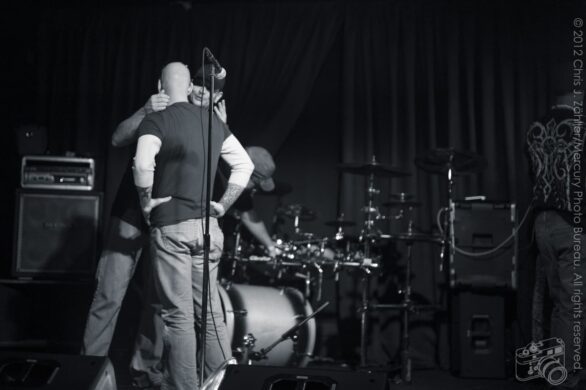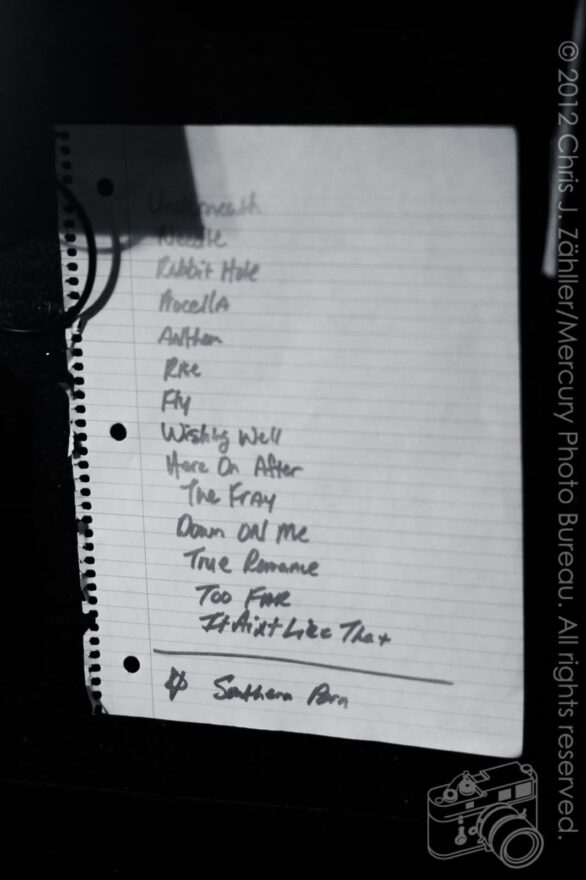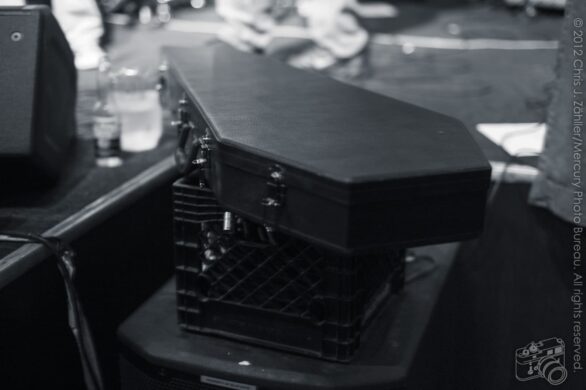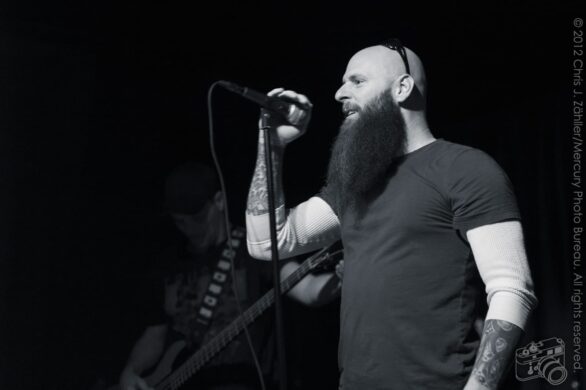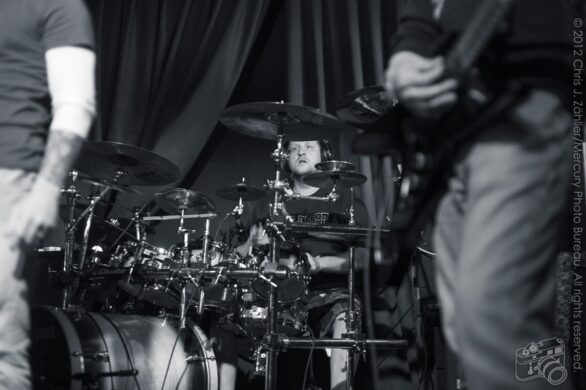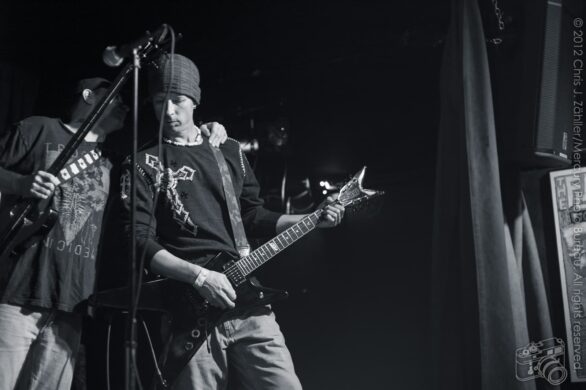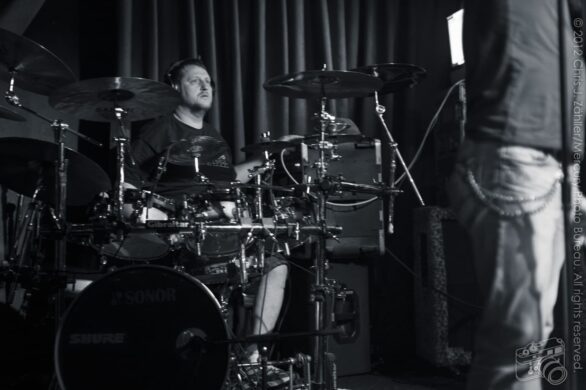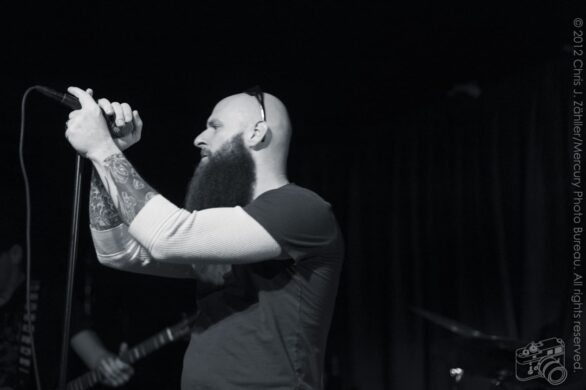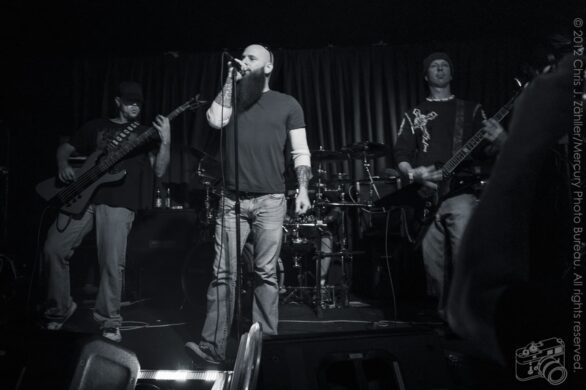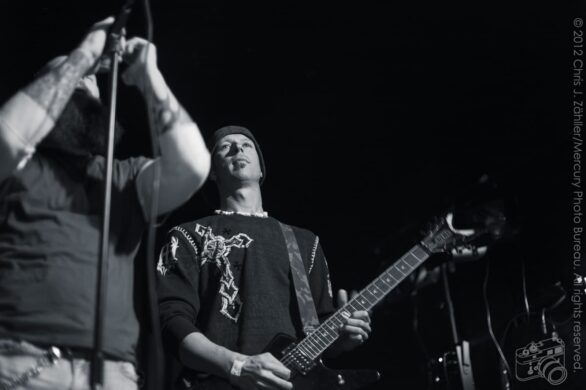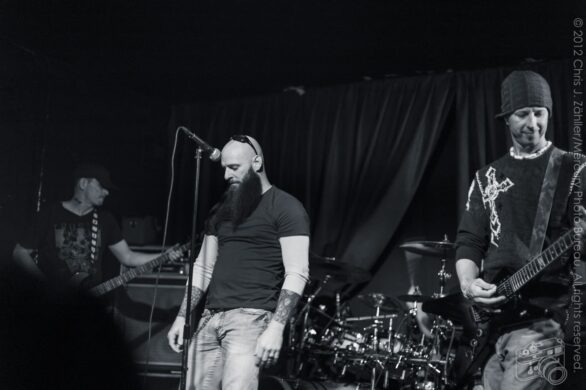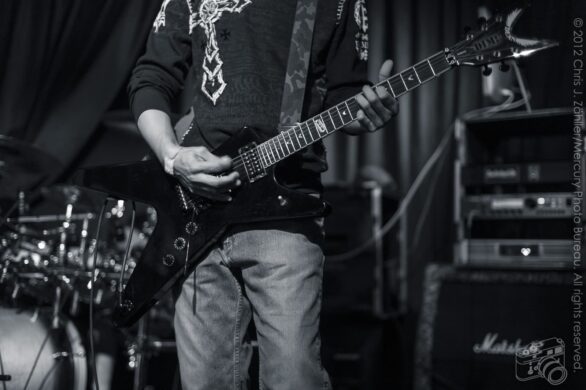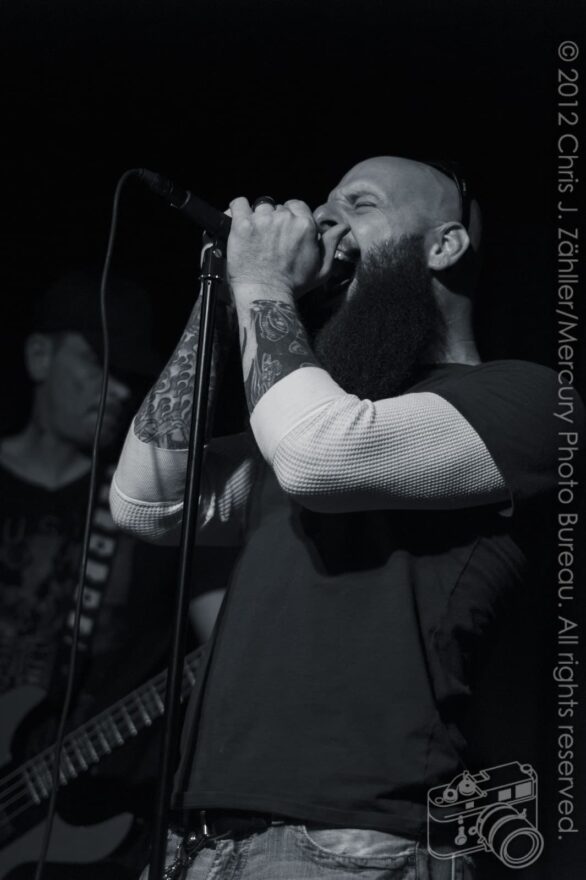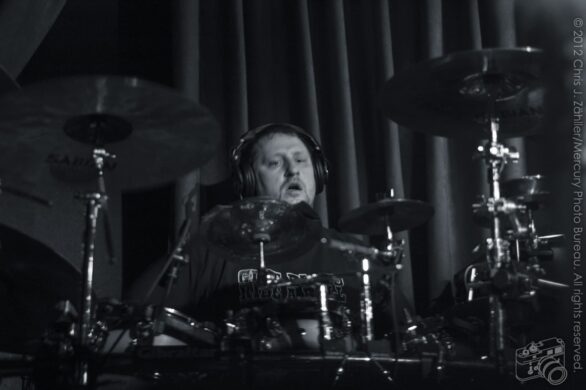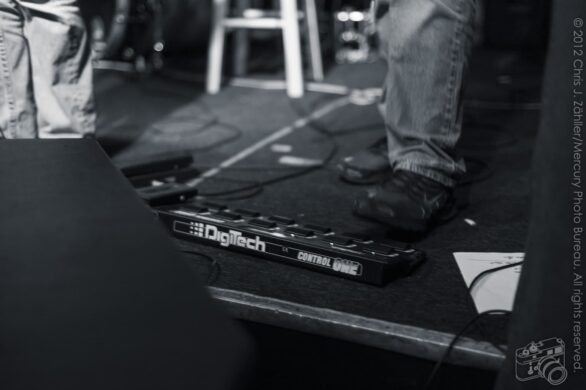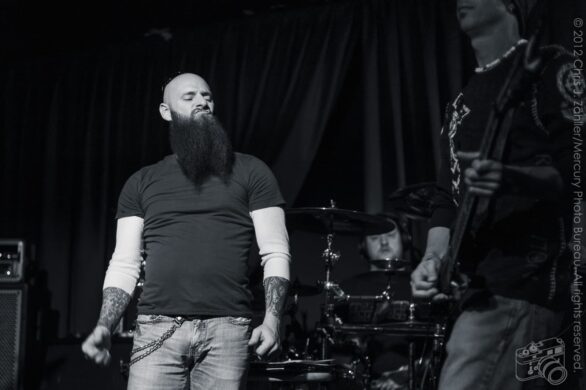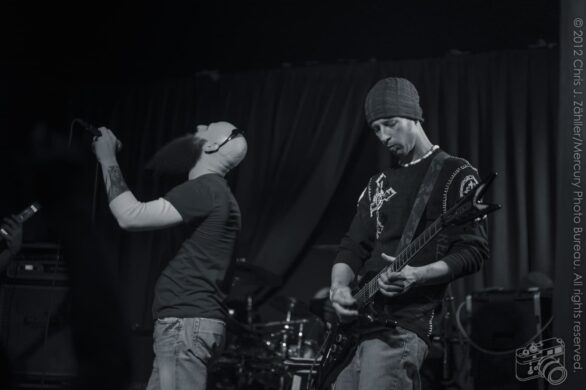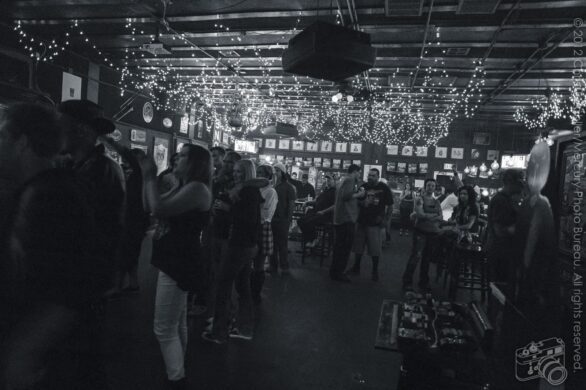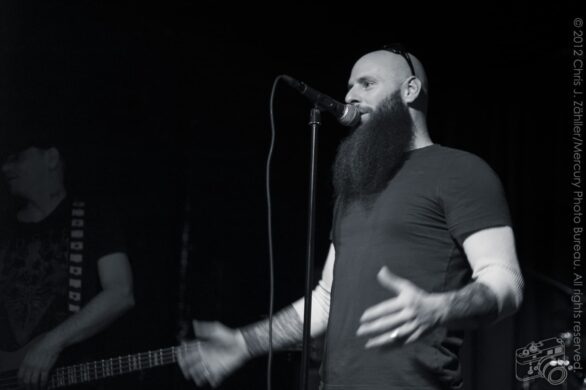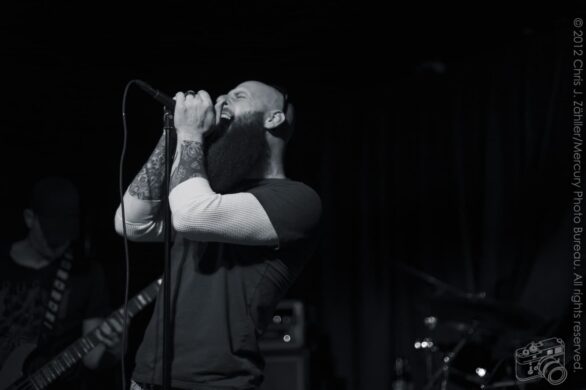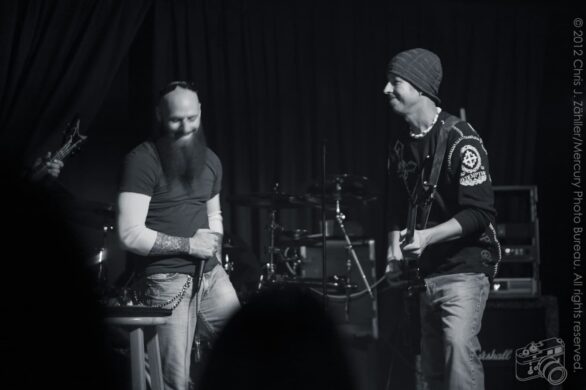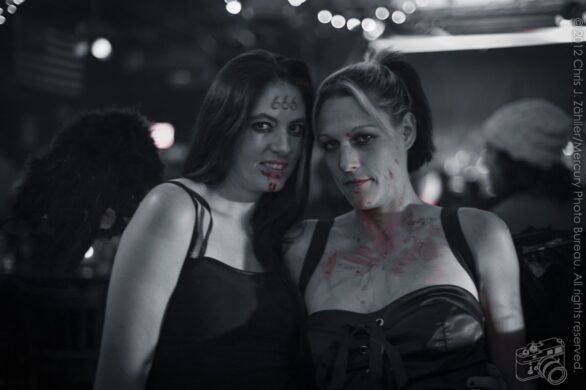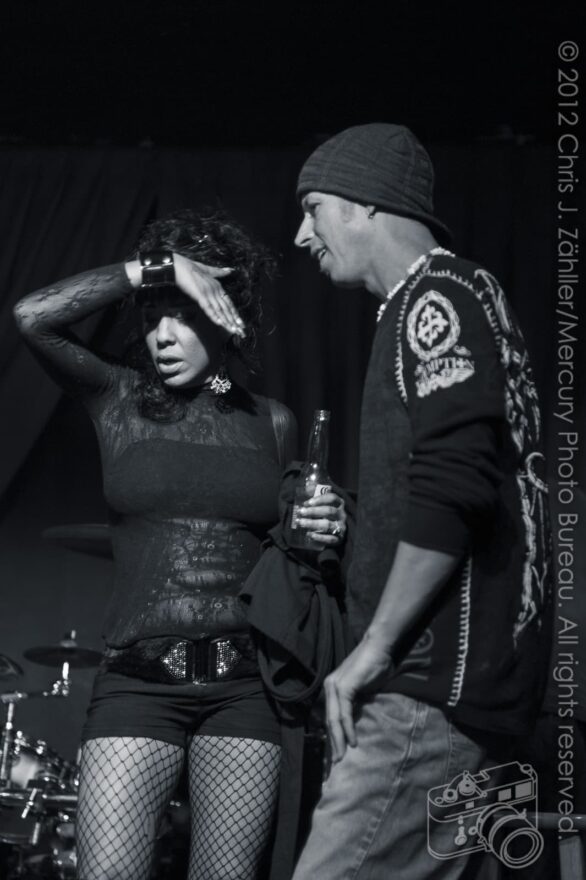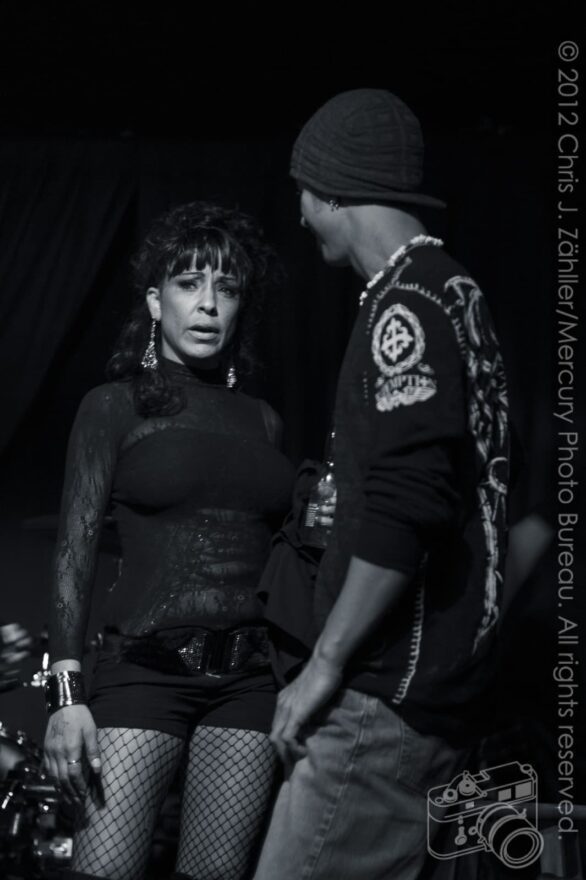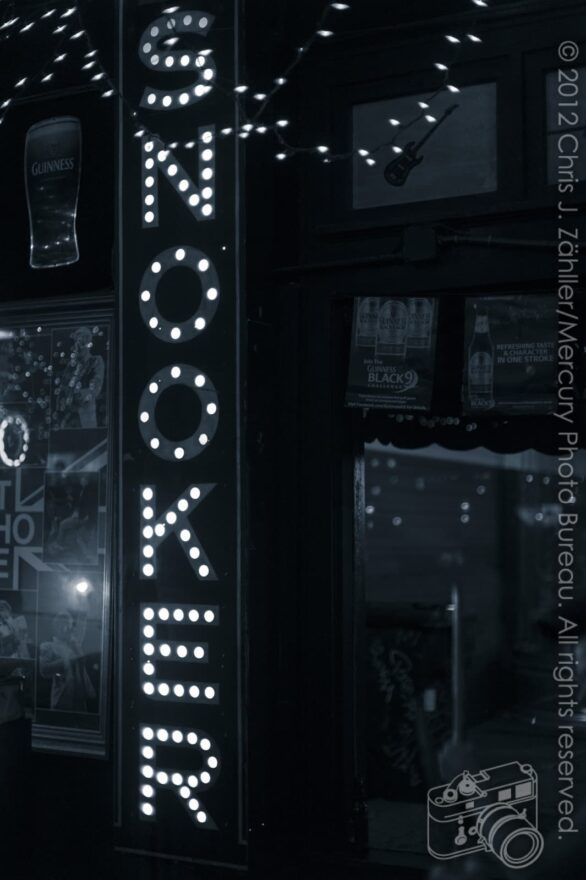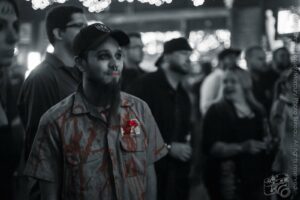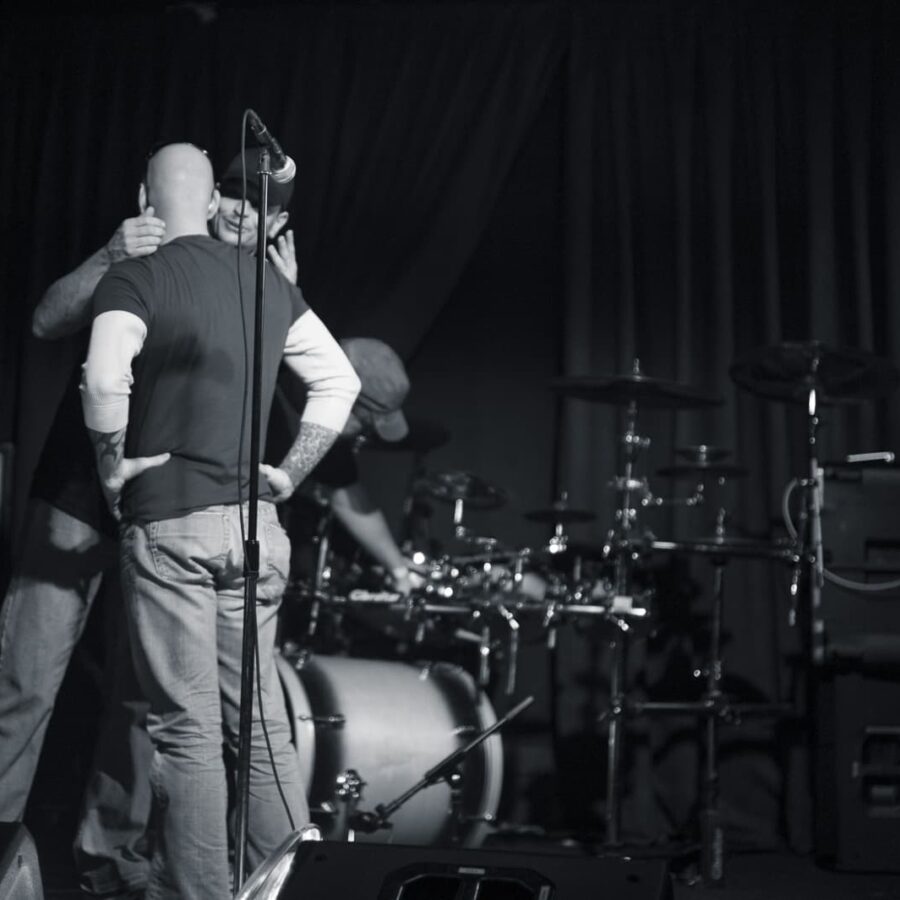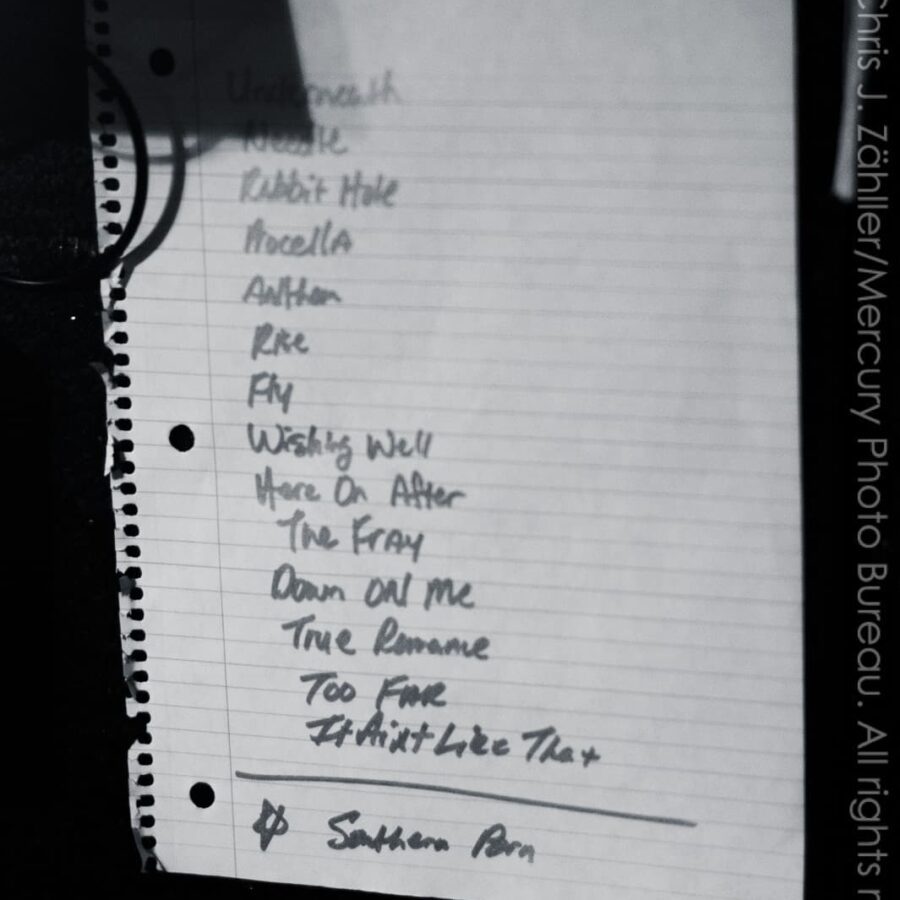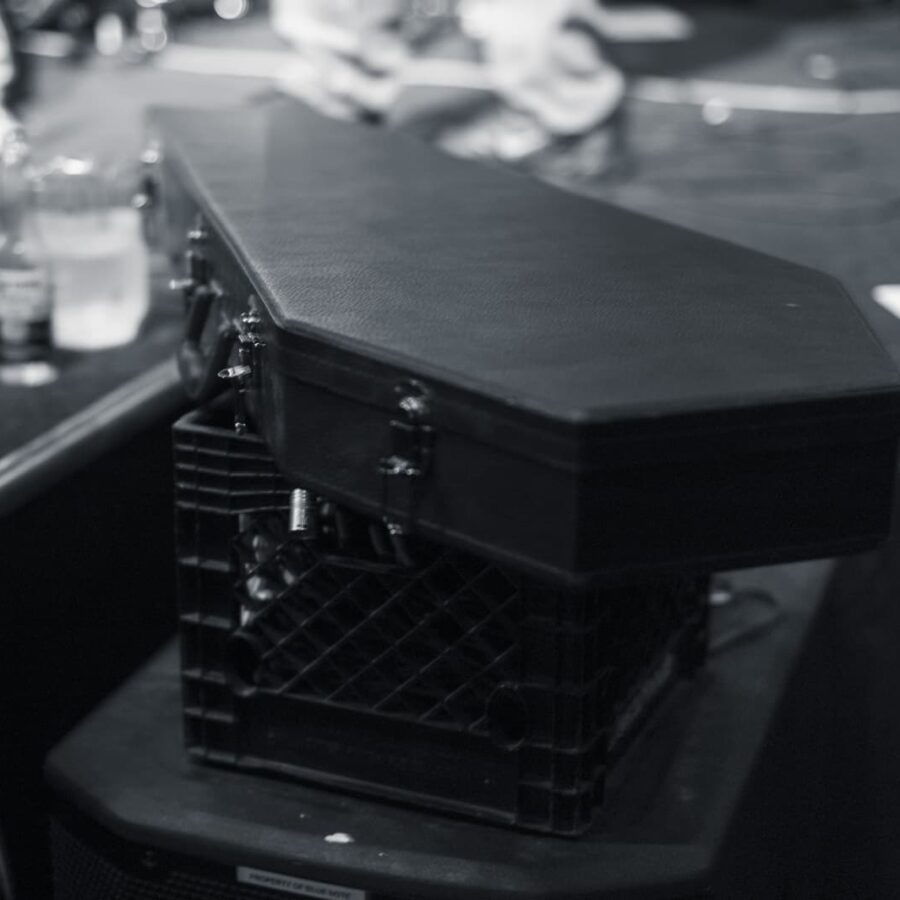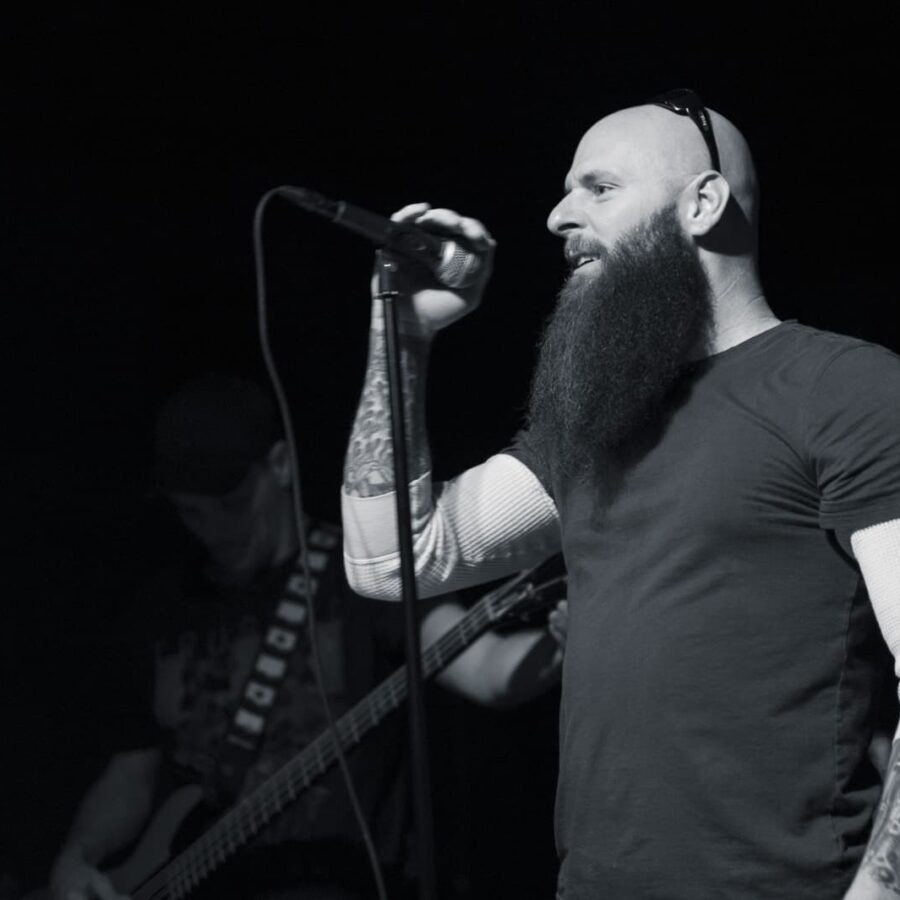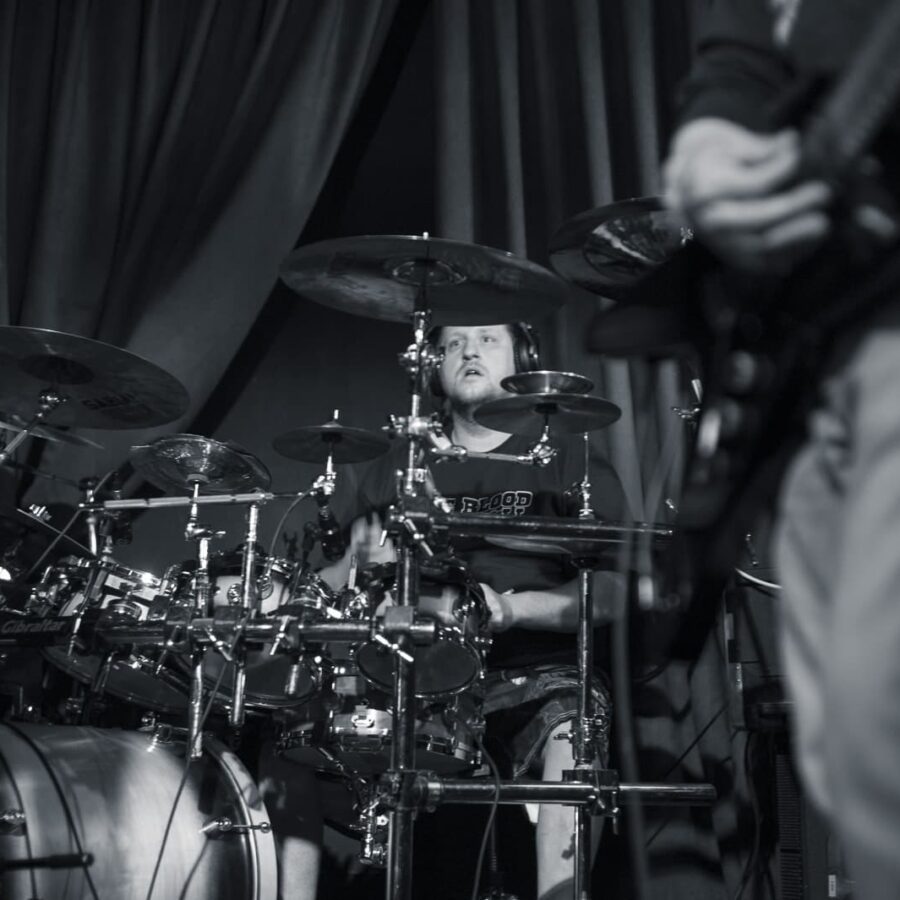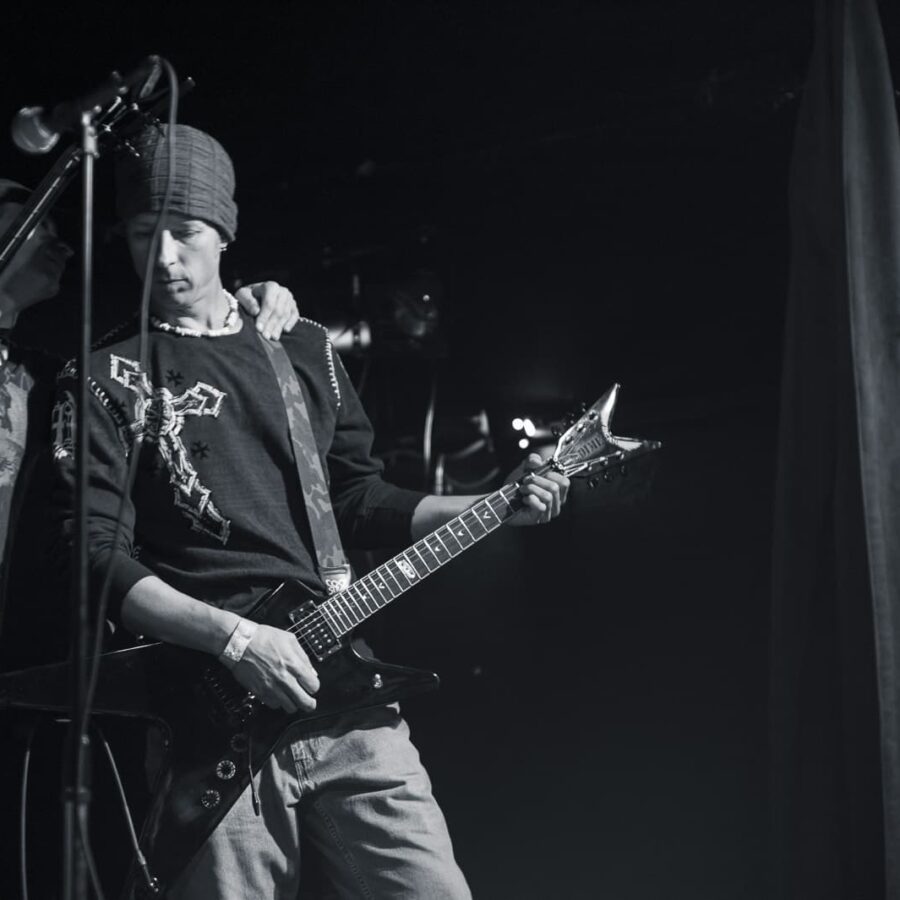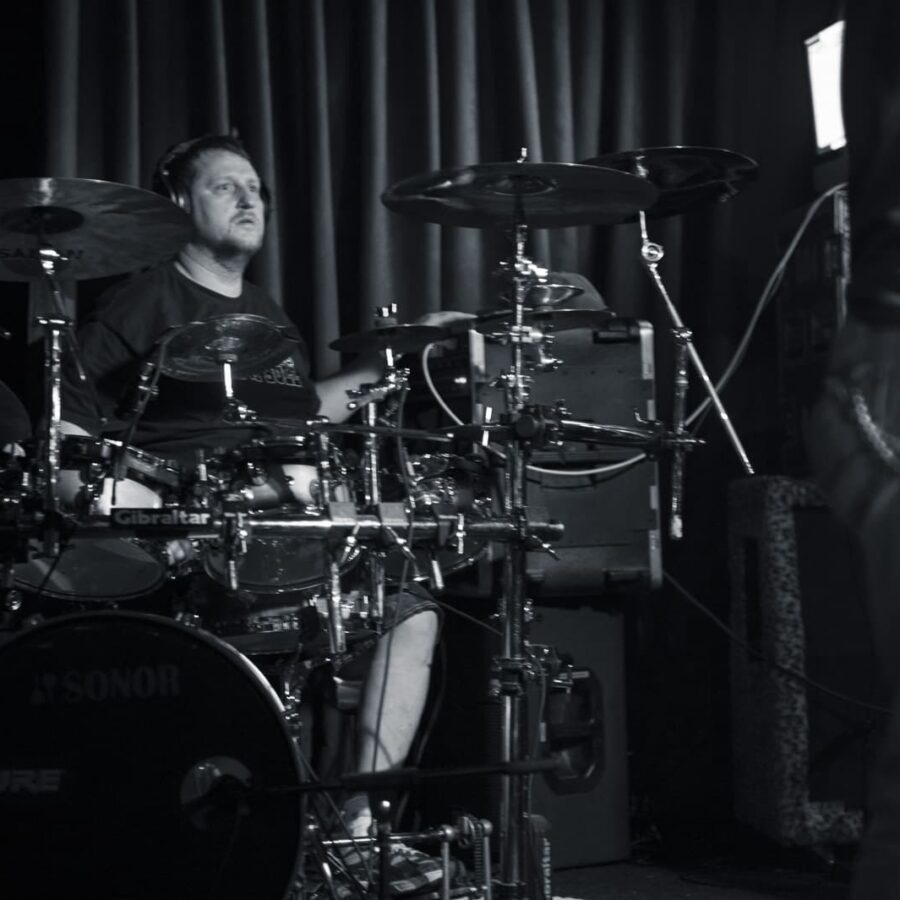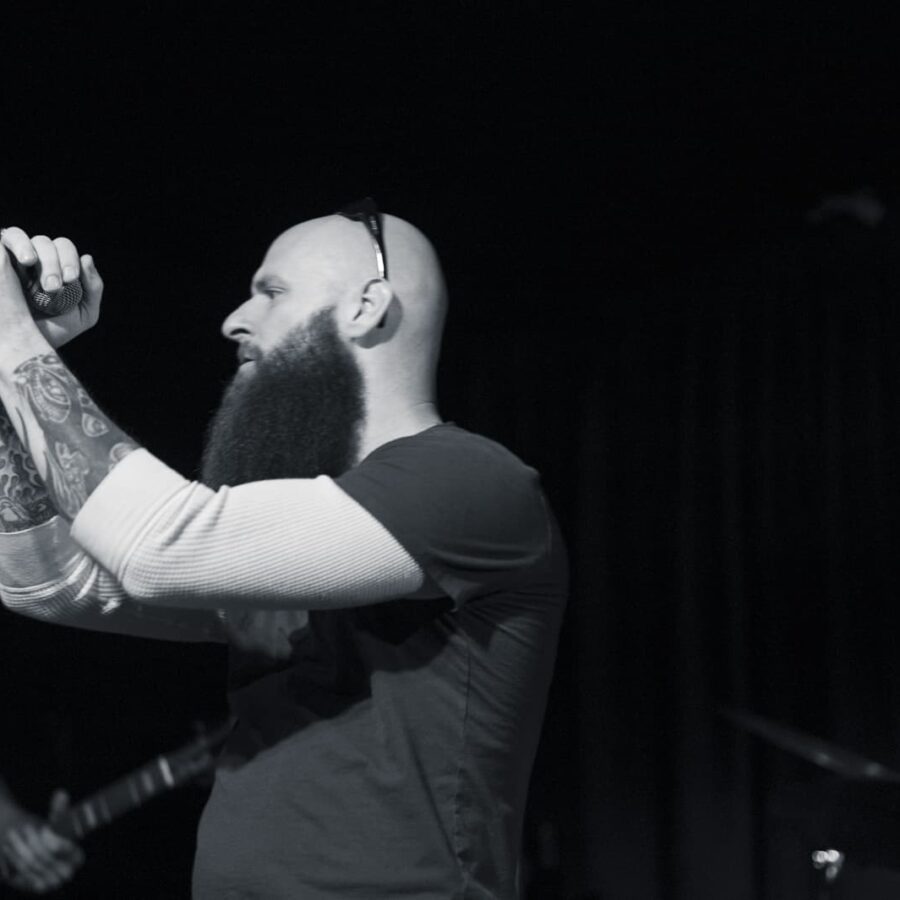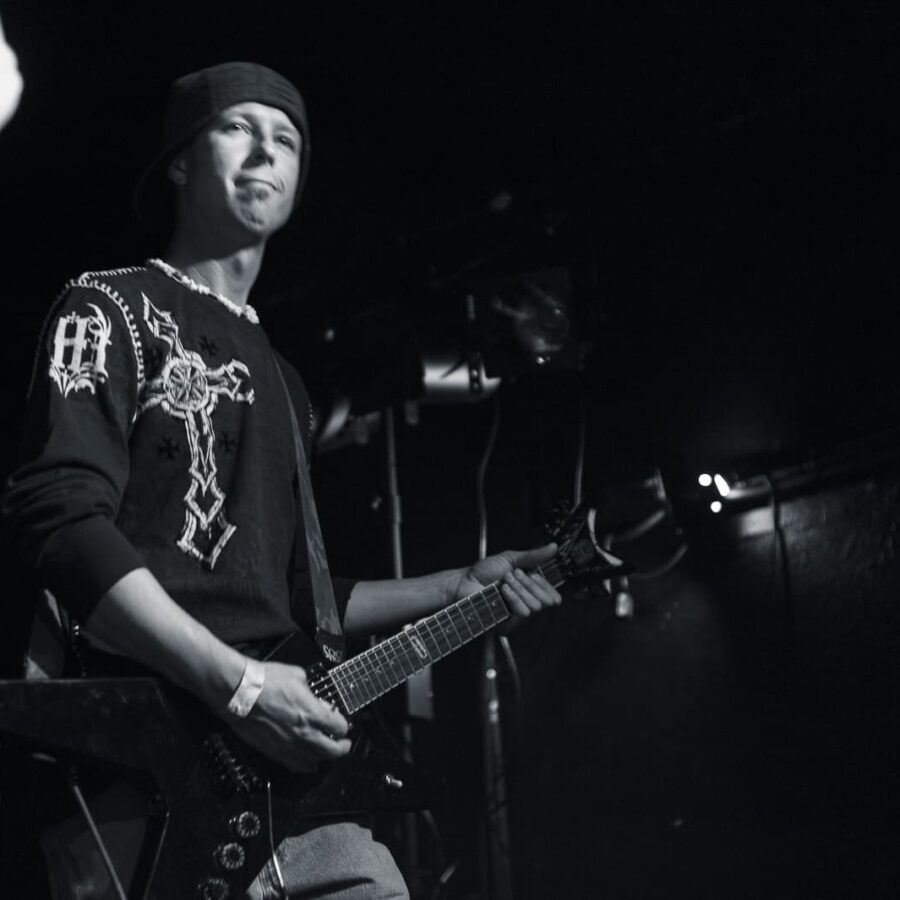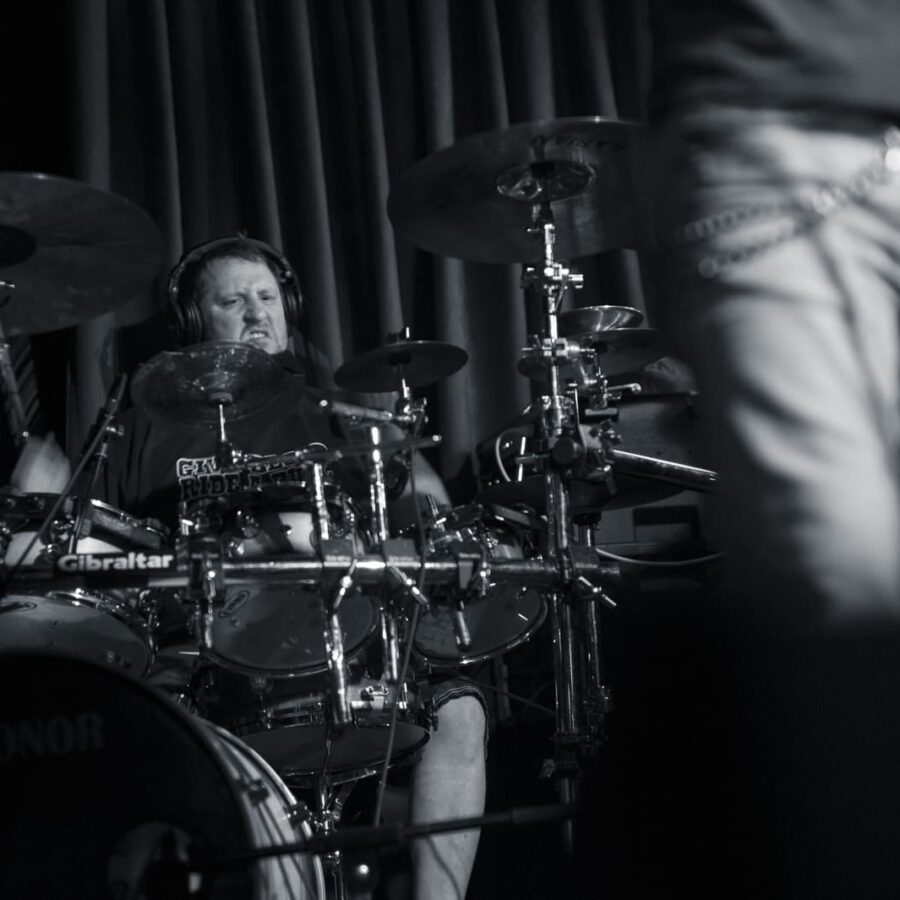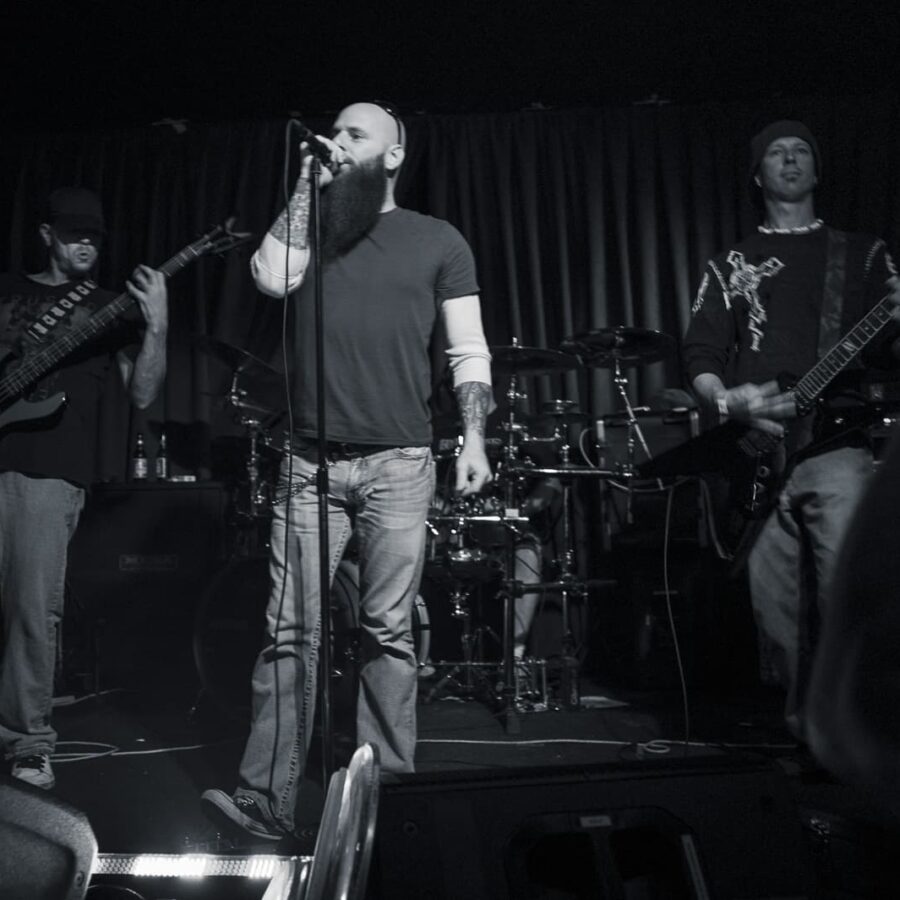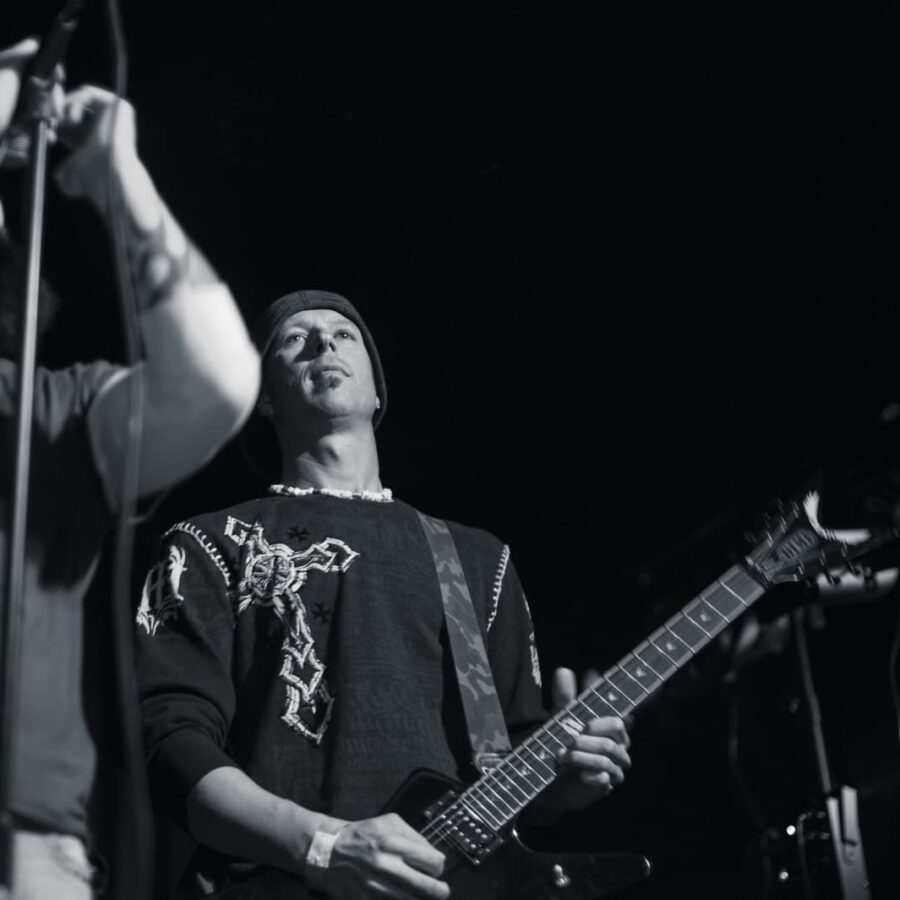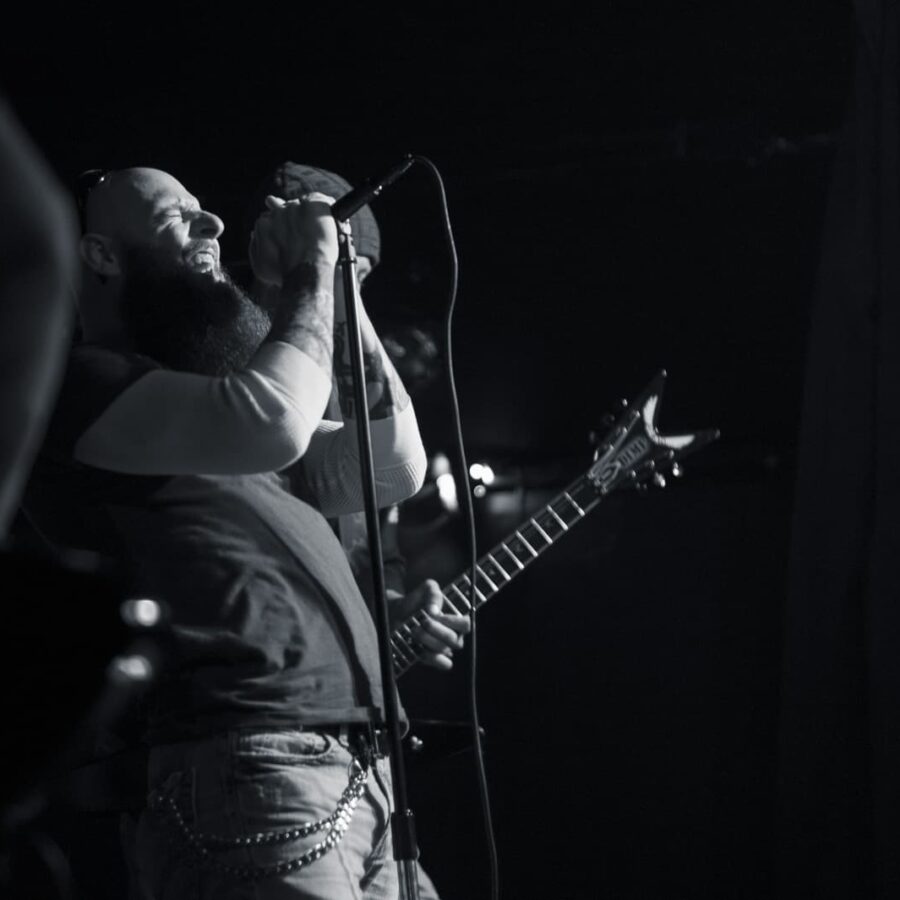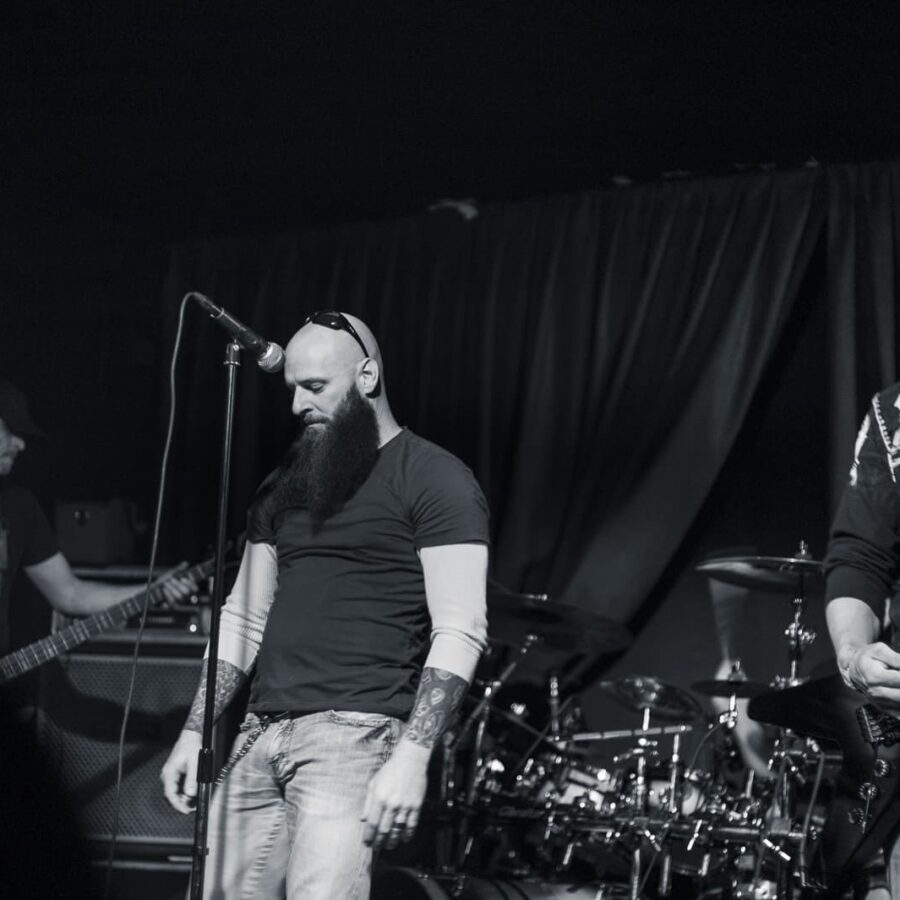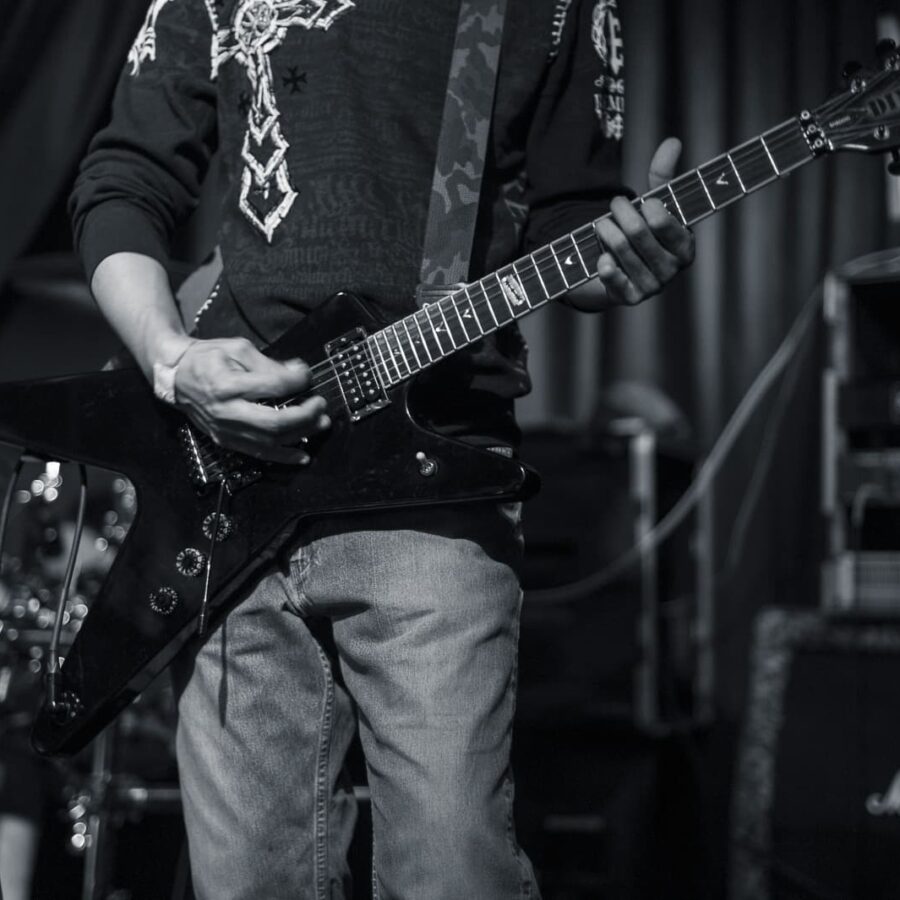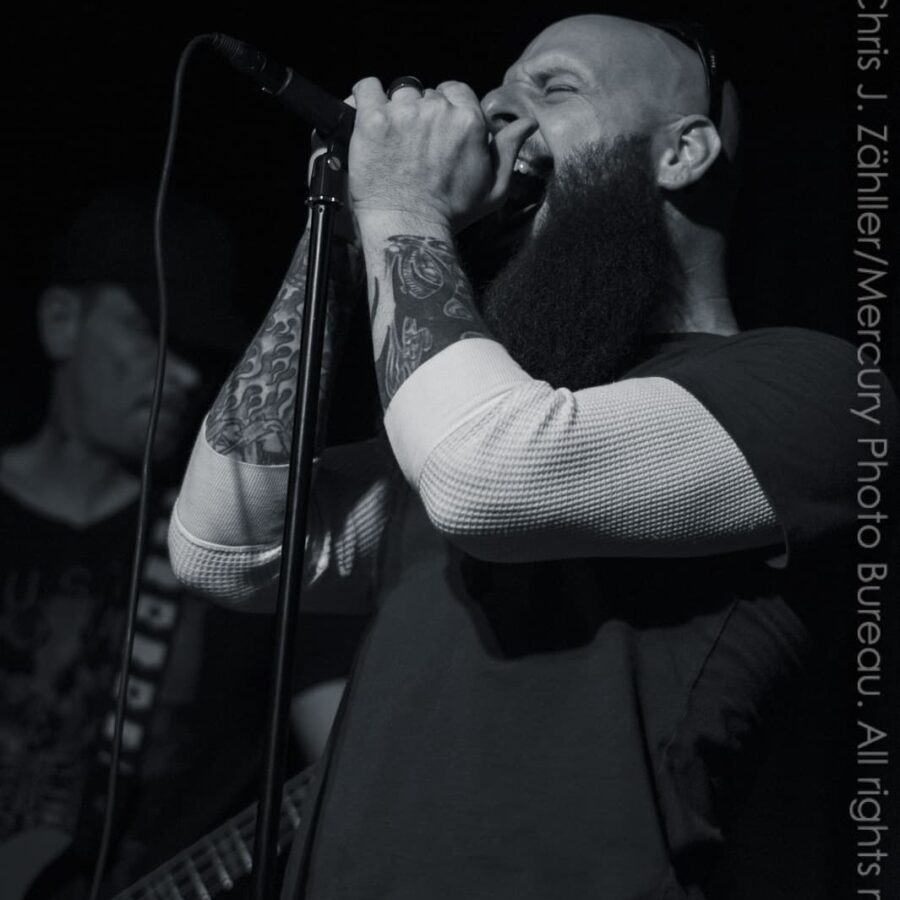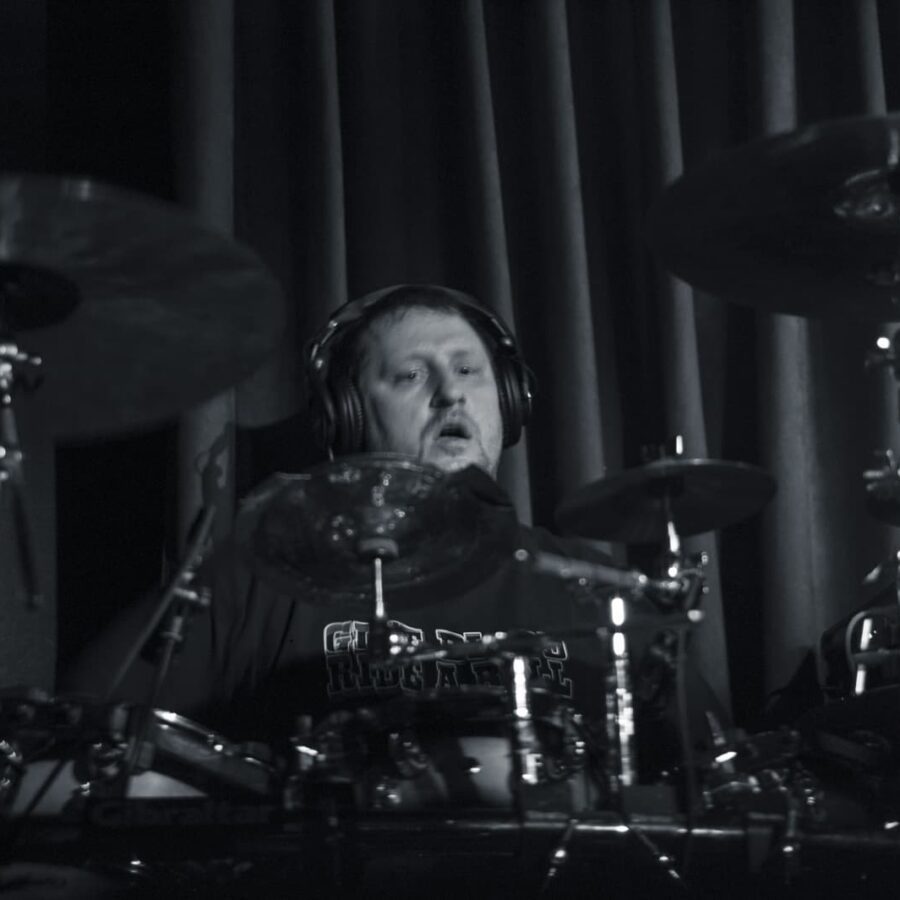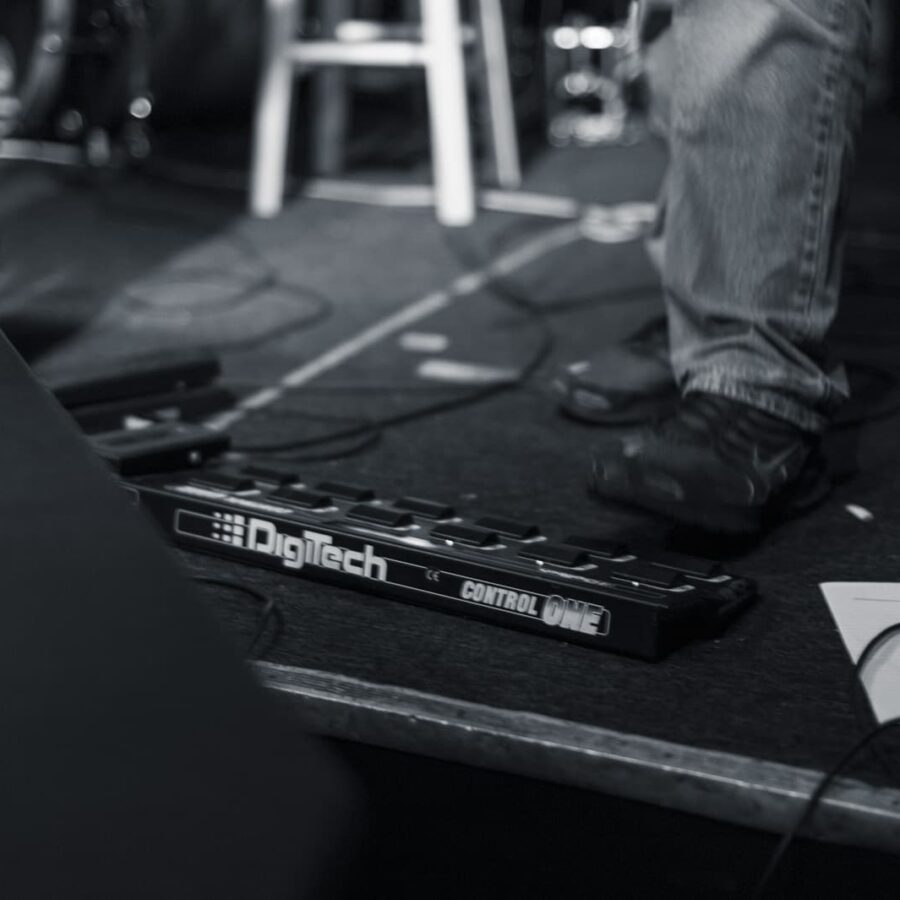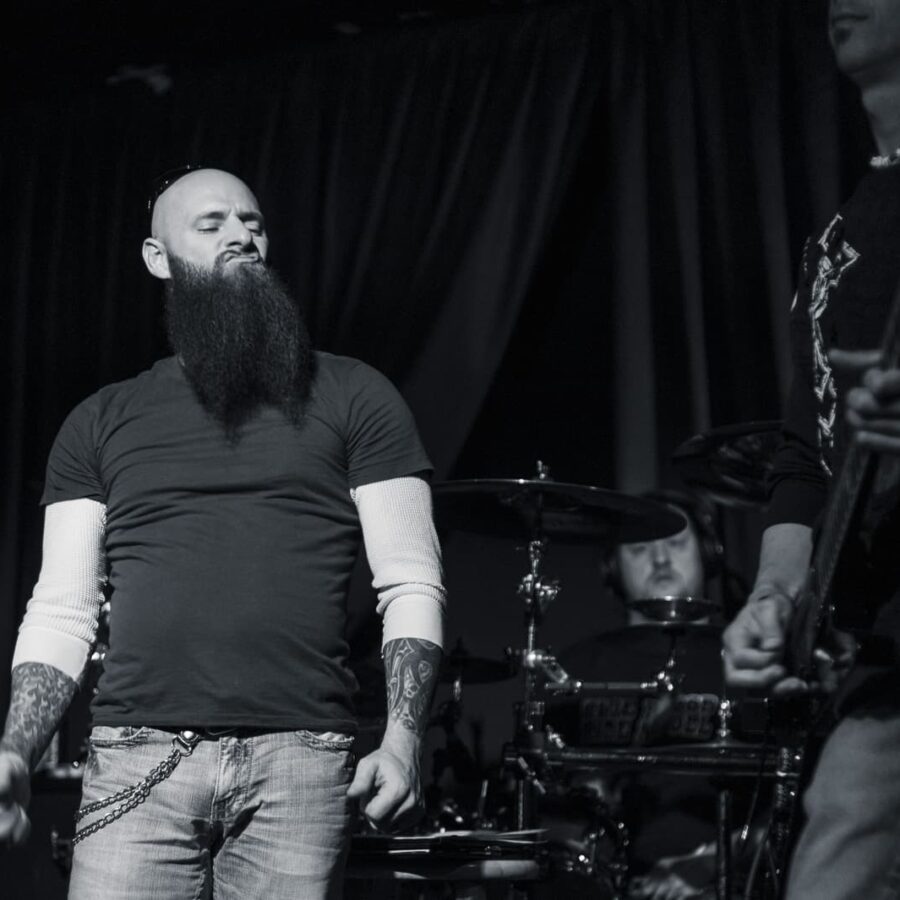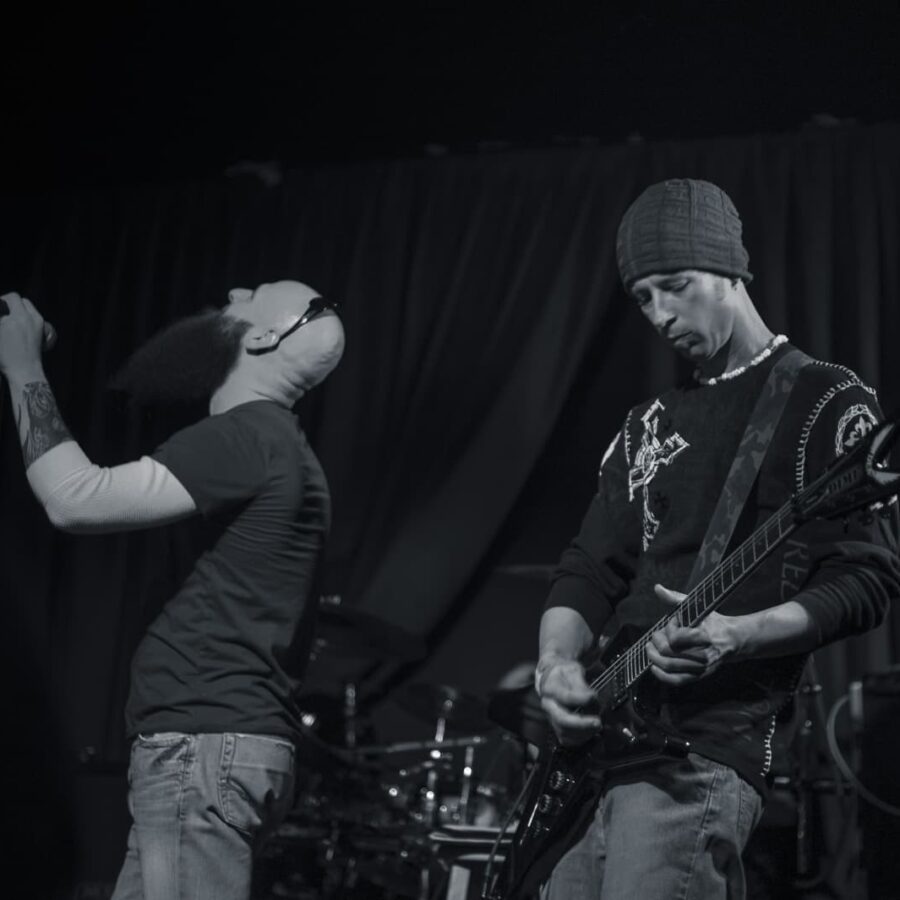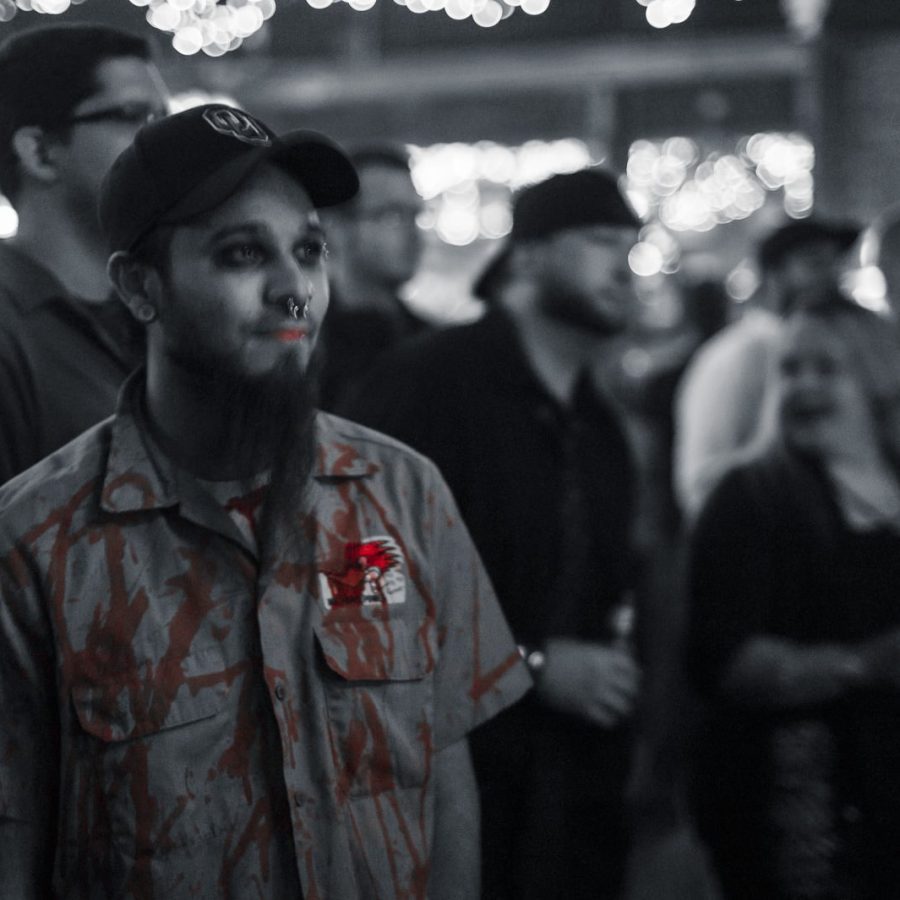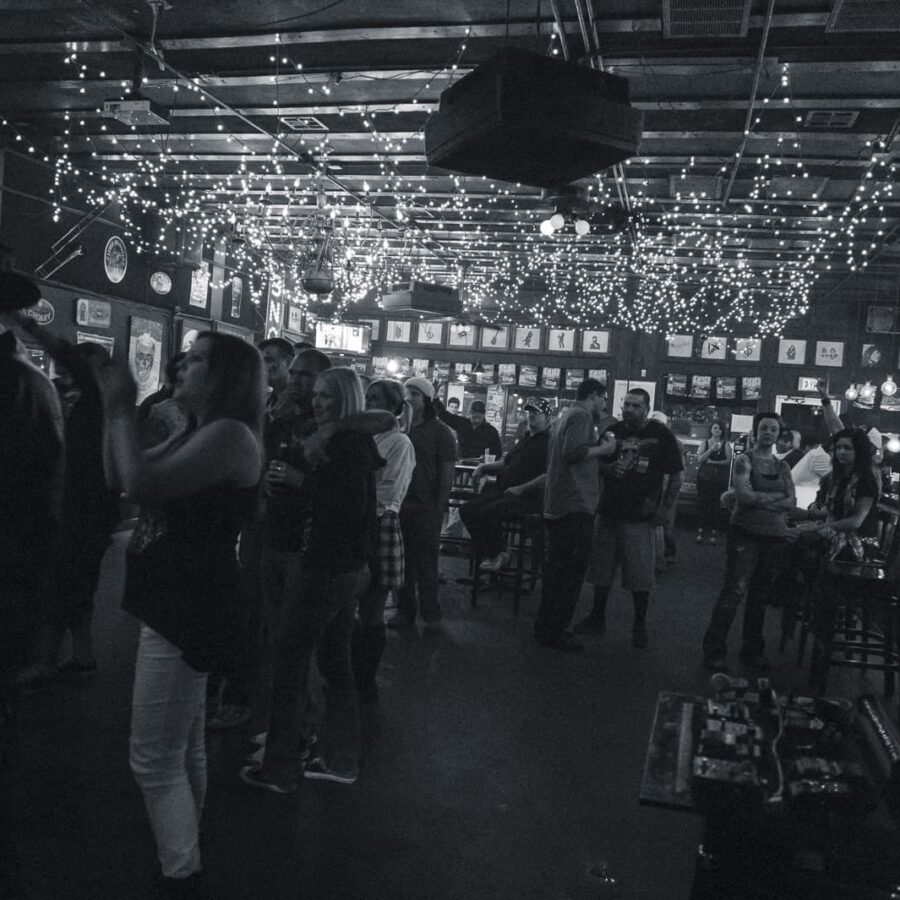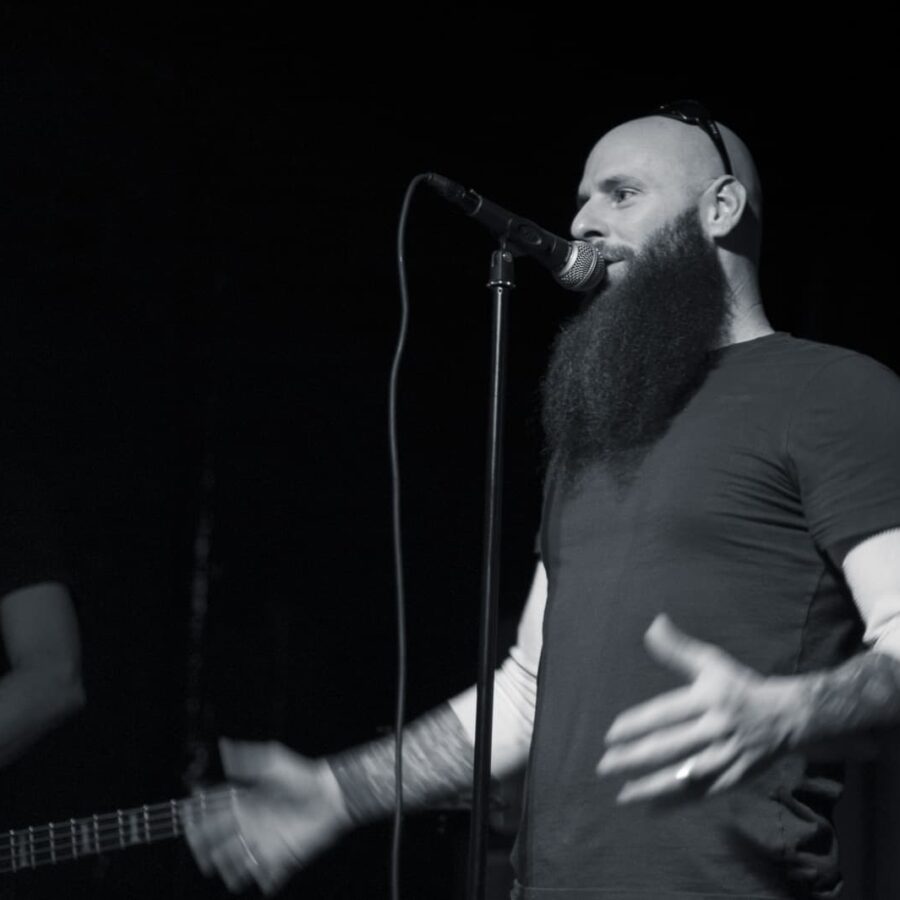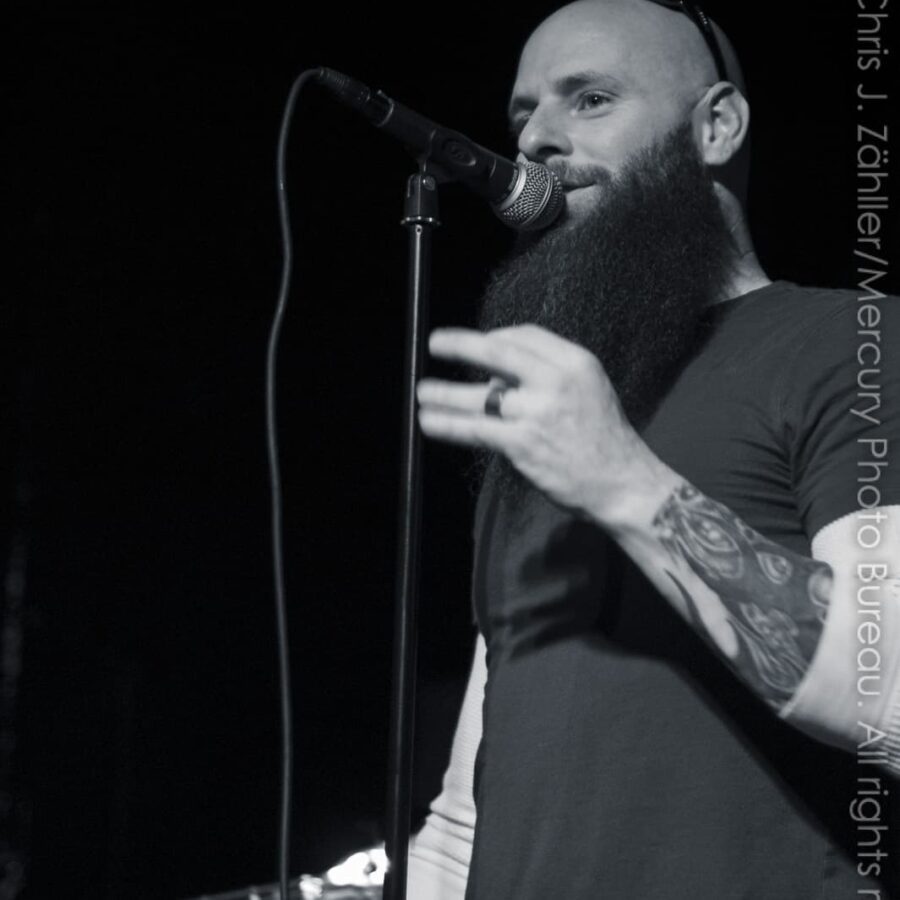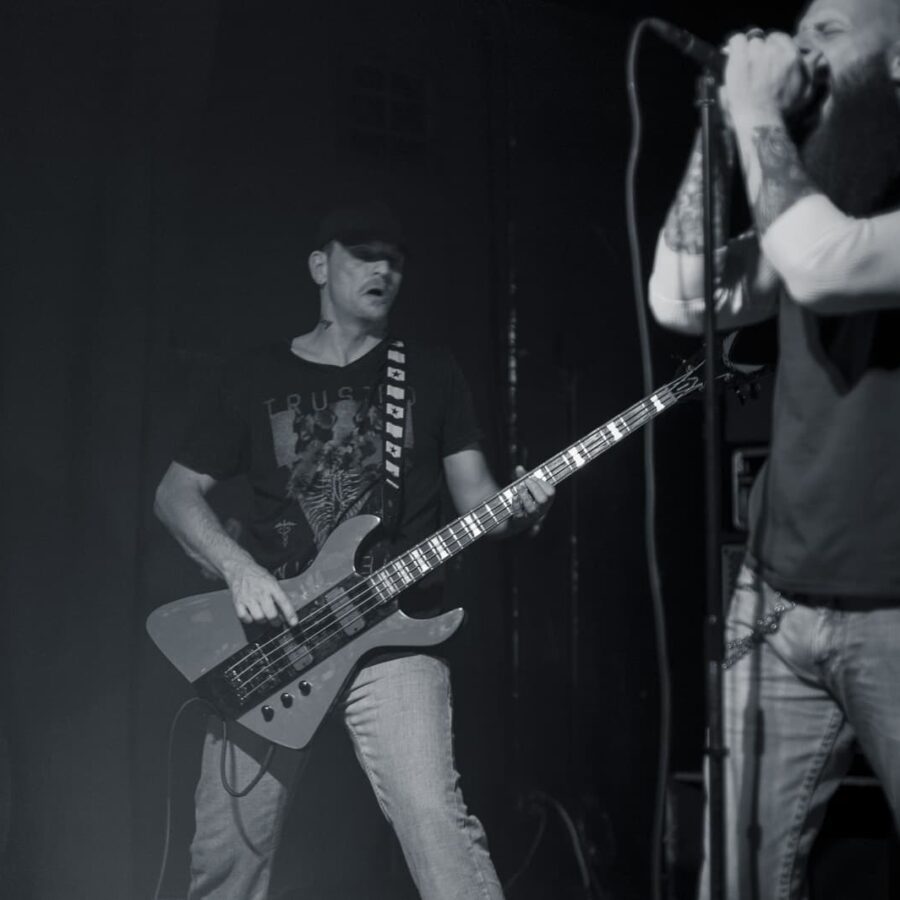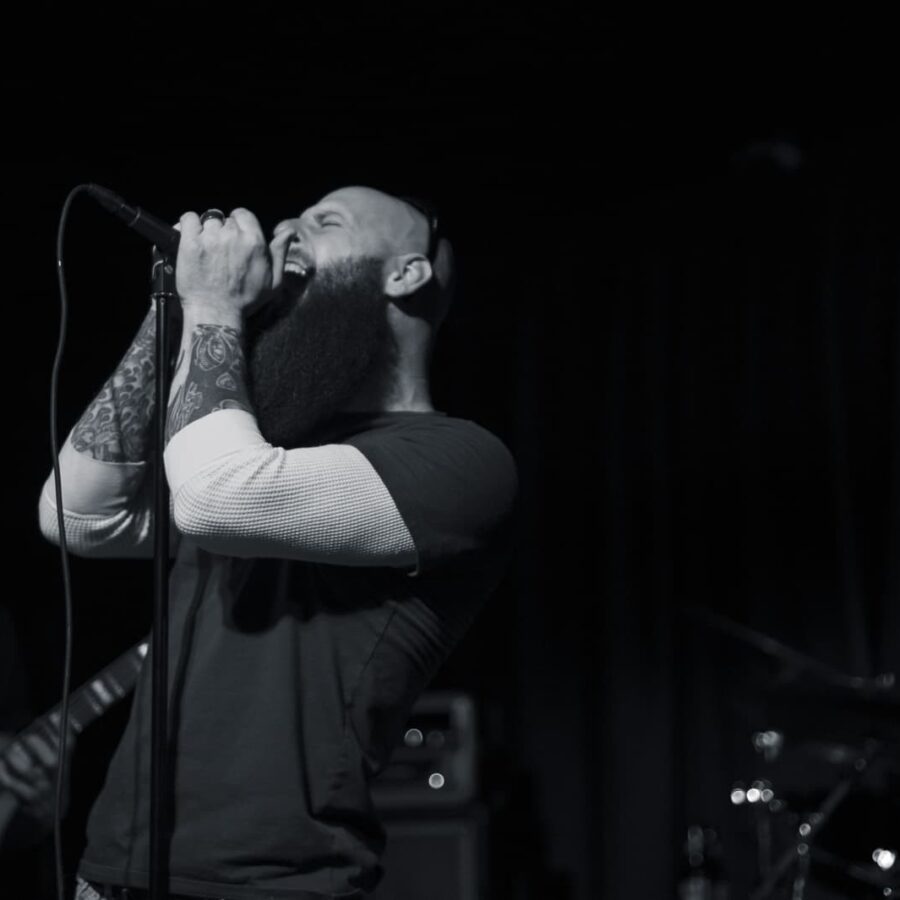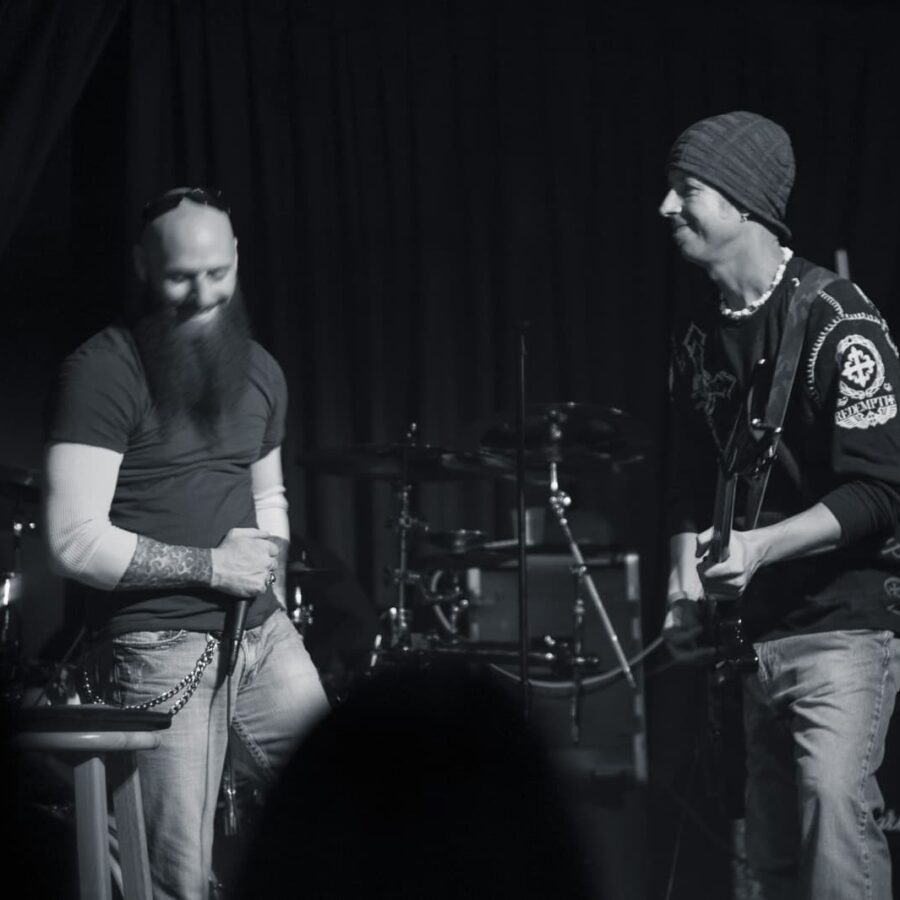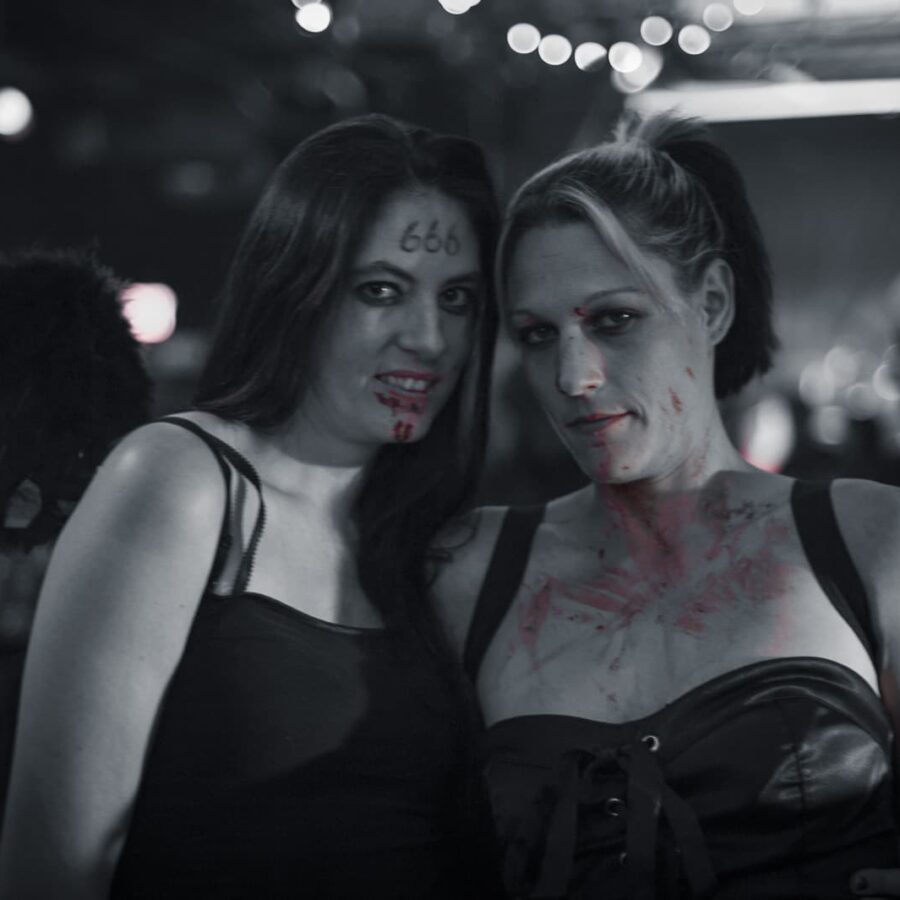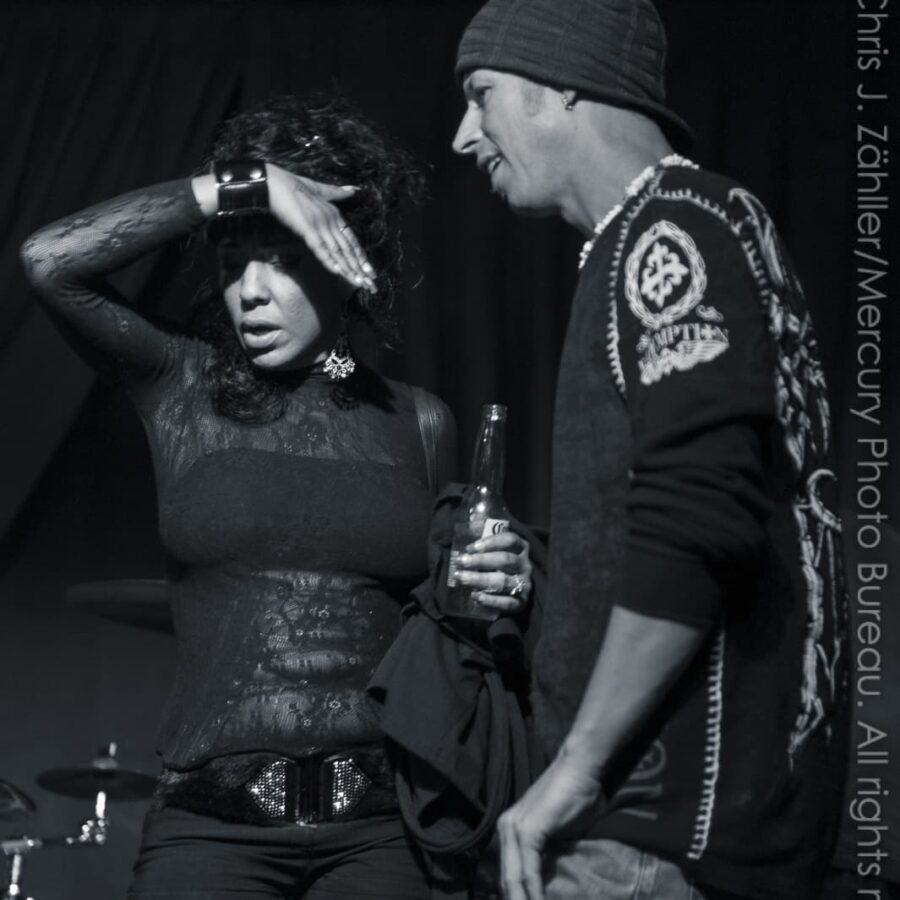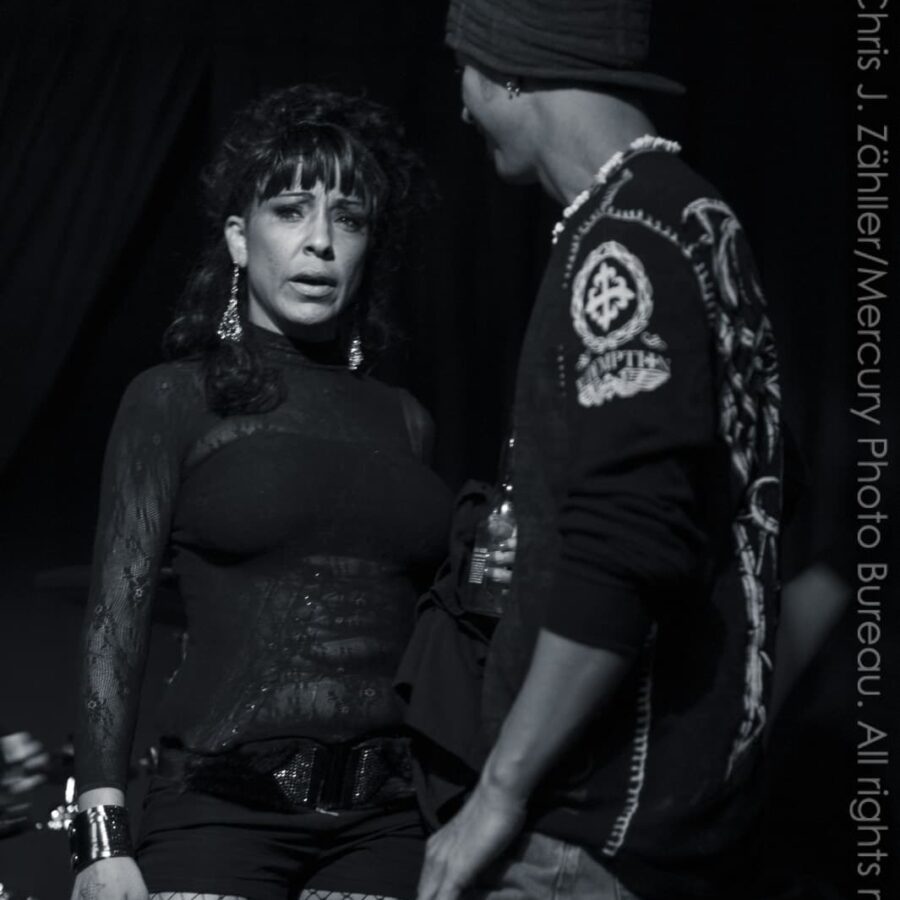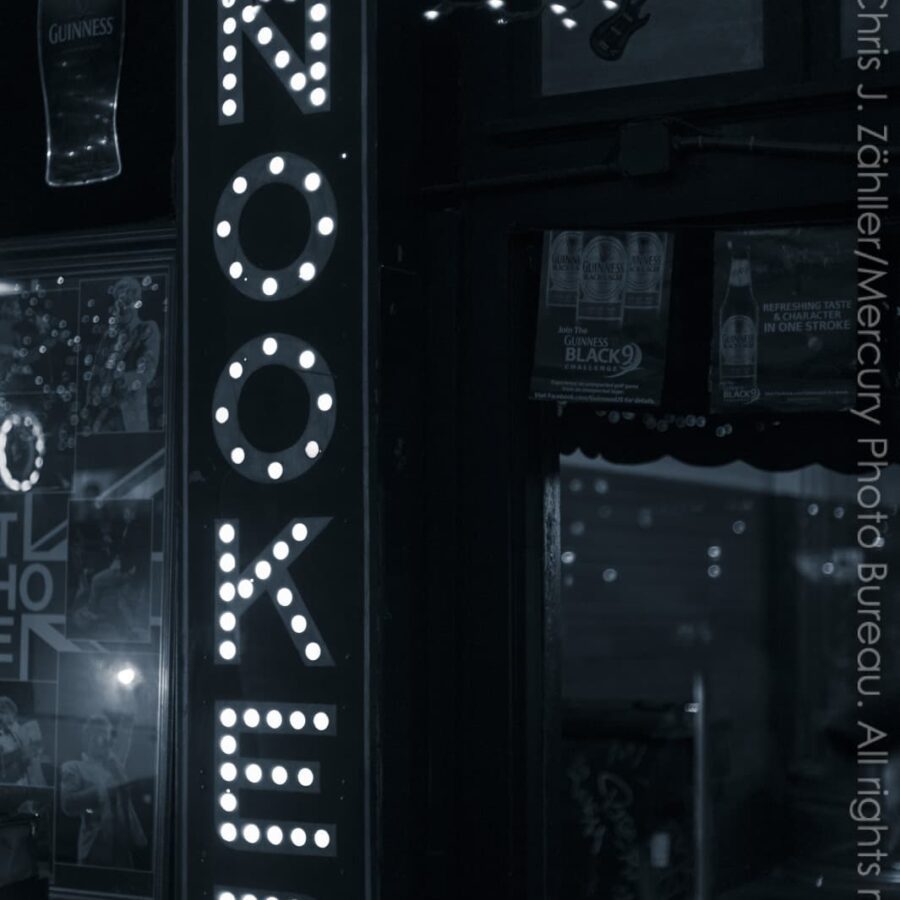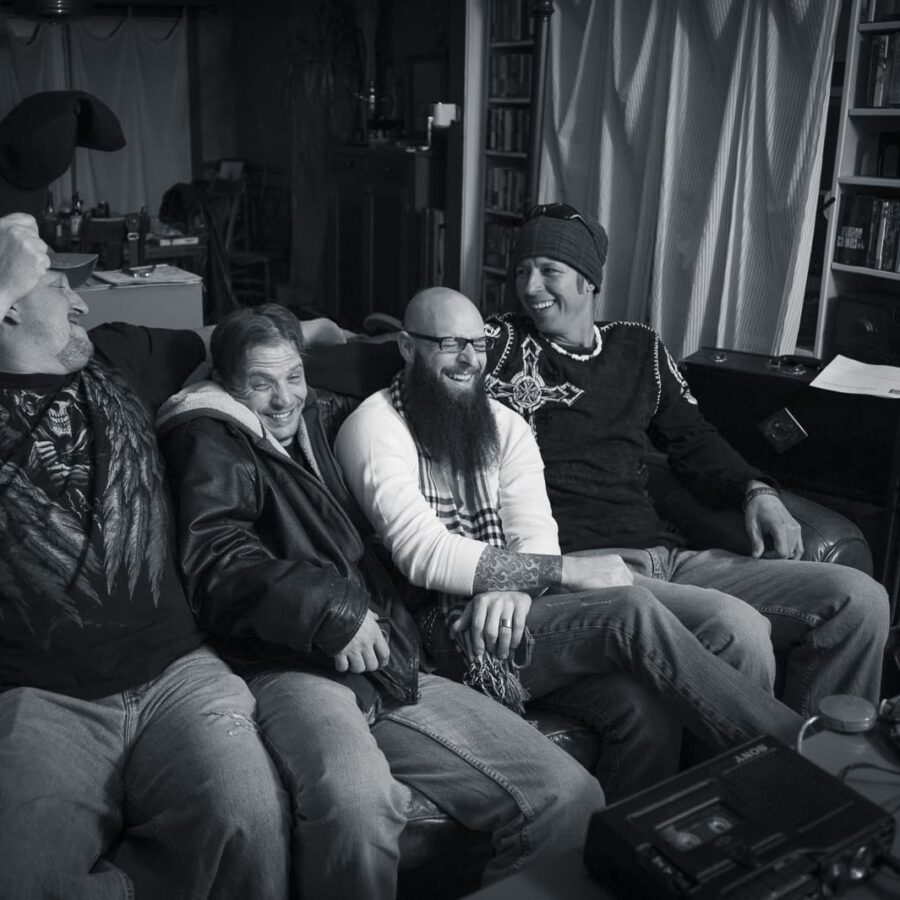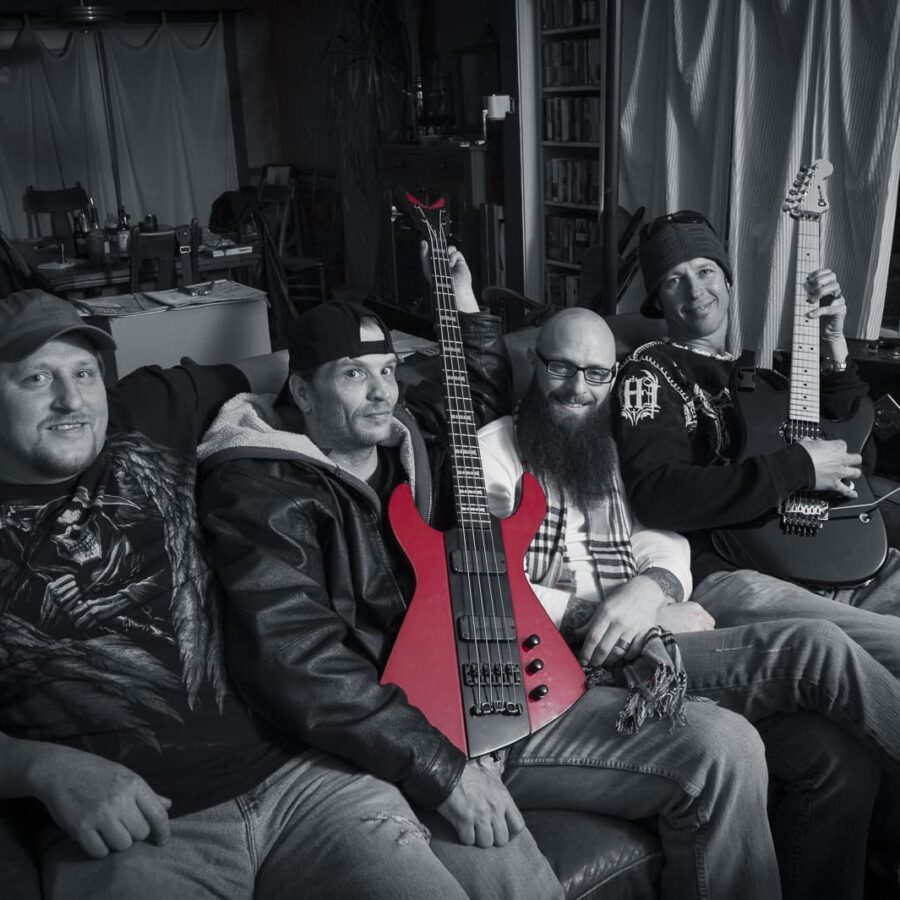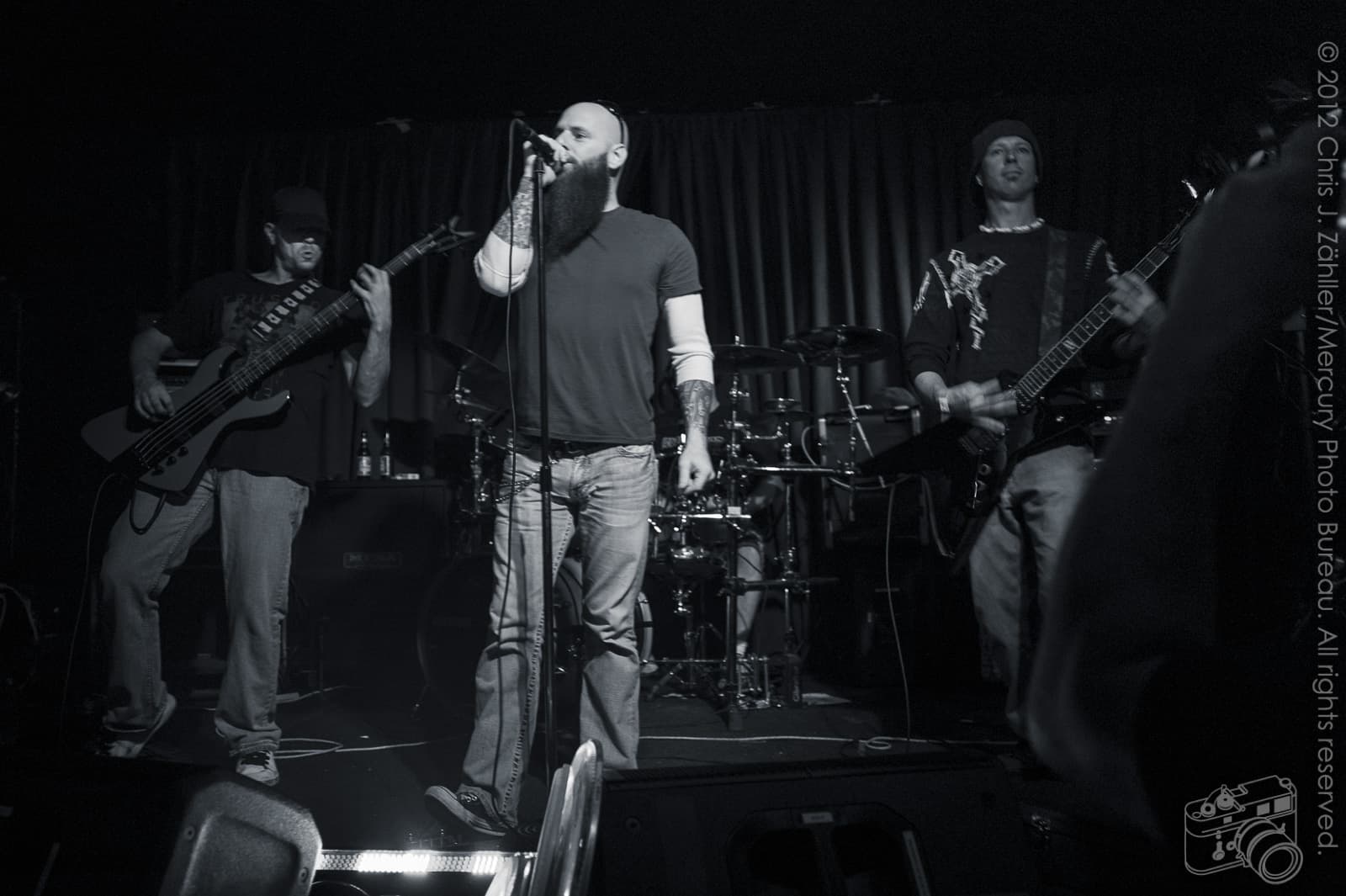
One Gun Solution — Interview and Gallery
The Interview
One Gun Solution Interview
Neo-grunge outfit One Gun Solution drove down from Oklahoma City to speak with me earlier this month. I met them at the CD release party for their freshman release, Perceptions, last October, after Kill the Reflection singer Matt Routt invited me. Short and muscular, frontman and vocalist Dave Washburn’s keen stare could back down the most beligerent drunk in the bars he freqently plays. His shaved head is contrasted by a mighty beard, which also appears in the band logo. He may look like a biker, but he reveals a bookish, intellectual bent during the interview.
Tall, lean, and laconic, guitarist Matt Francis is soft-spoken and thoughtful. He conducts himself with polite southern manners suggestive of a kind of upbringing one rarely encounters these days.
Gruff-voiced, fast-talking bassist Raymond Dick is the group’s trickster, usually the 1st to make an amusing crack at his fellow’s expense, unless drummer Jim Paterson beats him to it. He’s a new father; if you see him at a show, be sure to congratulate him.
Jim Paterson looks like he wants to kill his drums when he’s playing, but in the flesh, he’s personable and funny. Like all the band members, he’s passionate about music, as will become evident in the interview.
Mercury Photo BureauHow’d you guys meet?
Jim PatersonI was in a country band with this really horrible singer, and Ray walked in to try out for the band. He started playing Master of Puppets […] and I started playing along with him, and he was like, Oh, really?
and that’s when we decided to go away from country […].
Raymond DickAfter a few lineup changes, we ended up with Dave and Matt —
JimMatt came 1st — he was with our last band, with our other singer.
Matt FrancisI was actually at Guitar Center, with my wife and little girl —
JimHis little girl actually introduced us.
MattYes, she was just staring at Jim, and I was just there getting guitar strings, just getting back into guitar playing.
JimShe was lookin’ around at her mama —
RaymondJimmy was doin’ the pædophile deal, lookin’ at the little baby! [laughter]
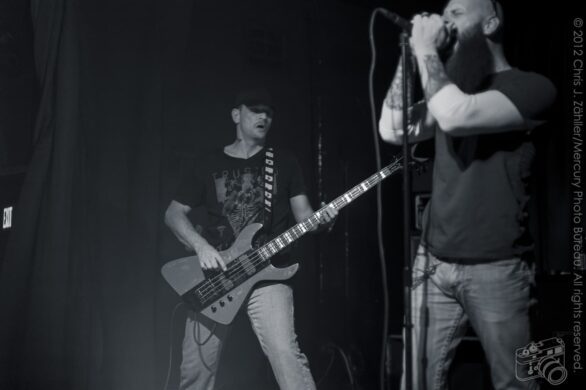
MPBThat might wind up in the interview [transcript], so be careful what you say.
RaymondScratch that, I’m sorry! [More laughter]
MPBI may just describe you guys as jocular, and not above having a joke at one another’s expense.
RaymondYou ought to see our rehearsals.
MPBHow did Dave wind up in the band?
RaymondAfter we got Matt, we were using Left to Die’s singer, Jeremy Waller. We jammed for a while, doing the heavier things, but after a while, we decided to go more musical —
JimAnd we needed a singer that was dedicated to our band, not split between 2 bands […].
MattAnd he needed to have a wider range of musical types that he could relate to, and articulate.
RaymondThat’s how we became One Gun Solution. Dave came with the name; when Dave came, we changed everything. We changed genres 100%.
MPBWhat were the challenges when you formed the band?
Jim[When we 1st got together,] me and Dave didn’t see eye-to-eye. And that’s because we didn’t know each other.
RaymondThat’s ’cause you’re 6′ 3″ and he’s, like, 5′ 2″. [laughter]
JimThen we […] got to […] This is more important than just, the way we feel about each other,
we just needed to learn more about each other to figure out who we were or where we were coming from […].
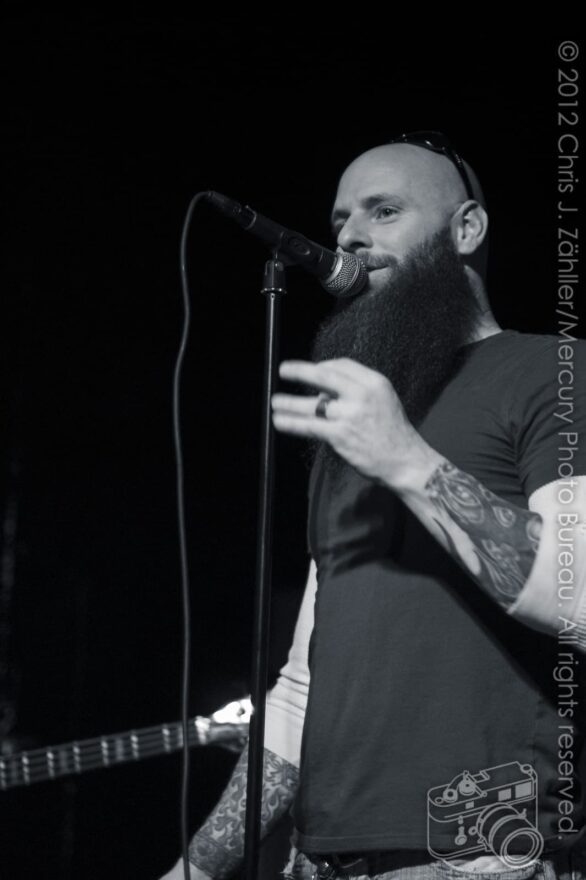
MPBHow would you describe your musical genre before Dave?
RaymondSpeed Metal, Thrash.
JimHardcore Metal.
MPBIf I were an A&R man and you were trying to get me to sign you, how would you describe your music?
Dave WashburnMusic for everyone. We write tunes we love, and, hopefully, everyone else will jump on board.
MPBIf I were that A&R guy and you came to me with that 30 second elavator pitch, I would not return your call, because I do not know what that means.
JimWe actually cover a broad spectrum of musical styles, even Soft Rock — borderline Pop-Rock — all the way up to Hard Rock. Not Metal; it’s just short of being Metal. We do have some Metal elements, like some of our guitar riffs might be a little Metal, but because of the tones we use, they have a softer sound —
DaveNothing that you might [not] hear on an Alice in Chains song.
MPBHow did you become musicians?
Raymond[…] I grew up in L.A., just 7 miles south of Hollywood, and everybody out there’s in a band; I mean everybody. I traded my bicycle when I was 13 [years old] for my 1st bass […].
When I came here, everybody was a little more laid back; I mean, it was easier to do, ’cause there wasn’t a million people doing it, you know? It’s always been something I’ve been interested in.
JimHe couldn’t handle being a male prostitute. [laughter] I started in the 80s; I was just starting to get into music. My brother played drums. I started watching bands like Def Leppard, and it really intrigued me — [Def Leppard drummer] Rick Allen only had 1 arm — I went from there, I started listening to Rush.
I’d heard them before, but I’d never listened to them as a drummer. And that’s when I 1st actually picked up the drums, because, before then, I was air drumming, because I couldn’t afford a full drum set. [Then] I started playing Rush tunes and I delved into progressive Metal and progressive Rock.
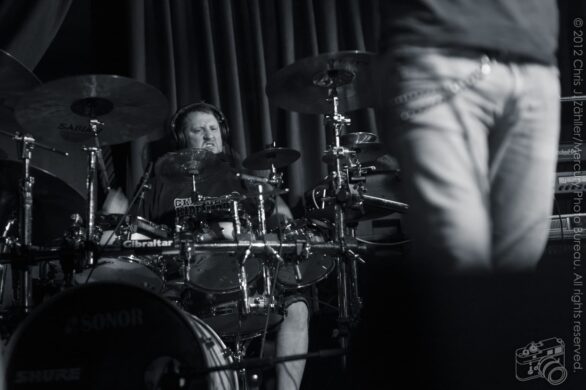
MPBRush were known for oddball time signatures. Is that what appealed to you?
JimIt was all of it; it was the fills that weren’t normal, generic fills; it stepped outside of the normal borders of a 4/4 time signature and it appealed to my [intellect].
DaveI’m from Texas, and for me it just started when I 1st heard a song on the radio. 1st 3 concerts I ever went to were ZZ Top (my dad took me). I remember as a kid, I had 4 sisters, growing up, just all in the back of our van and singing along [with the radio].
I’ve done so many things in my life, but I’ve always come back to music […]; there’s nothing else that really completes everything for me.
RaymondHe couldn’t even handle the porn. [laughter]
MattI got my 1st guitar whenever I was about 12 years old, and my mom bought it for me; it was a Sears special with the little speaker in it, good for in the bars; an electrician rewired it for us and I got some new pickups in it. I never had any formal lessons, until I was about 13 [when] I had 2 [lessons], and, by then, I’d gotten a better guitar. I started playing because it was an outlet for my emotions and I could articulate what I was feeling […].
DaveI’ve been a writer since I was in about […] 3rd grade; [that’s when] I wrote my 1st short story, and it got published and [I read] it aloud to the whole school […].
MPBI take it that you write most of the song lyrics?
DaveYes.
JimHe won’t let anybody else write ’em.
MPBMatt, could you tell me what was going on that you wanted to express through music?
MattWell, just [the craziness] at school; we moved around a lot and Dad left [when] I was young. It was just a crazy time […], so [music] was just an outlet for me […]; other people use other things. Actually, the main acoustic riff in Here on After, that’s the 1st thing I ever wrote; I wrote that when I was 13.
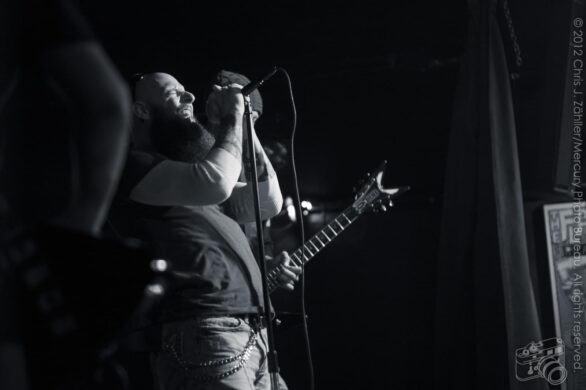
MPBDave, some of the lyrics are pretty straightforward; some of the lyrics are opaque. Underneath the Skin is right out there; it’s about pædophilia in the church, but some of the others might benefit from some exposition: I’m thinking of The Fray and Down the Rabbit Hole, which seems to be about a girl contemplating suicide.
DaveAbsolutely. I’m big on stories; that’s what I love about country music. […] A lot of times [the band] will come up with a riff or a whole song, and I’ll come in and figure out how I’m going to approach it. I listen to the song a million times and try to find [a subject].
[The Fray is] my favorite track [on Perceptions], aside from Here on After. [It’s] about being in an abusive domestic situation. You always feel stuck [in this type of arrangement]; your friends tell you to [to get out of it]; you hear, but you don’t listen; you stay for whatever reason.
MPBIs Here on After the sequel to The Fray?
DaveNo; do you remember that old movie, Carrie? That whole song is about that.
MPBWhen you listen to the instrumental part the band brings you, do you look for a particular emotion to serve as a jumping-off point for a narrative?
DaveWell, thankfully, [I’m] in a band where there’s so much chemistry […], particularly [between] Matt and I […]; we’re like peas and carrots. I don’t know what it is, but whenever we’re together, everything just seems to fall in place, and it’s so easy to write together.
MPBWhile we were having drinks before the interview, it came up that you want to re-record a couple of the songs from Perceptions and re-issue it.
DaveThe album was just really rushed. We were recording with Provo Provenzano at Pirated Sound Studios in Purcell; he’s 1 of the best ears in the state. We had a deadline: we had the CD release show, and we bit off more than we could chew […].
After listening [to Perceptions repeatedly] over the last few months, we want to go back [and fix some of the tracks].
JimWe recorded Rise Against without Provo, so we didn’t get the full remastering to CD, and there are some problems on it.
MPBWho do you admire or emulate, musically?
Raymond[The late bassist for Metallica] Cliff Burton, [Iron Maiden bassist] Steve Harris. Probably them 2, as far as, like, original influences, from when I 1st started playing bass. They’ll always be my heroes, but as far as nowadays, talking about the sound of the bass, I like Tool [bassist Paul d’Amour] and [Geno Lenardo from] Chevelle. As far as [technique], I’m still influenced by Steve Harris. I like the new sound with the old influences.
JimThese guys will tell you I pretty much live Dream Theater. Mike Portnoy is my favorite drummer. [I also look to Rush drummer] Neil Peart.
But, it doesn’t matter who it is; whatever music I’m listening to, I try to feel what’s inside it. Like, whenever Ray plays bass, I don’t sit and go, Well, okay, I’ve gotta play a 4/4 time signature.
I play what I feel. […]
[Tool drummer] Danny Carey is [a gifted polyrhythmic drummer]. Mike Portnoy is […] phenomenal […] all-around. I look at [what useful things] they bring […] and add them to [my personal technique].
DaveHands down, I’m a huge Grunge-head […]. The 90s were just awesome for me [; I was a teenager then]. Eddie Vedder; back in his prime, he was just untouchable. His story telling, his presence; he could do anything and still carry a note.
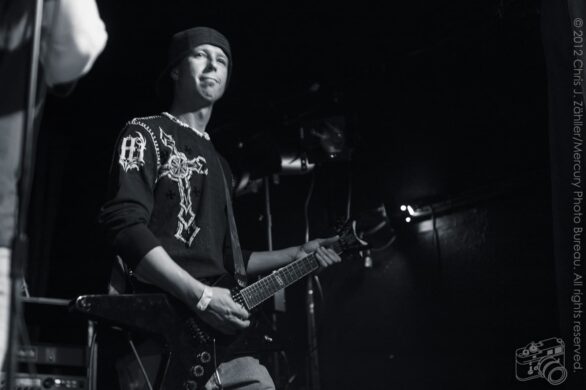
Matt[Guitarist] Nuno Bettencourt from Extreme; now he writes and plays with Rihanna; he’s definitely a huge influence.Jimi Hendrix, Steve Vai, Joe Satriani, Paul Gilbert.
MPBWith the exception of Hendrix, I’d classify these guitarists as technicians, you know, somewhat clinical in their approach to playing. Do you put emotional expressiveness ahead of technique?
MattAlways. That always comes before the technical stuff. [Those guitarists], and I want to mention Eddie Van Halen as well, they were very technical, but you could always hear the stories they were telling. Whatever the song title was, you could hear it, you could totally picture it, whether it was an instrumental or whether [it was a vocal number]. You can play scales all over the place, but the true greats articulate their emotions through their playing.
Jim1 person who lacked that was Yngwie Malmsteen. He was fast; he was bad; but after about 60 seconds, I feel like I’ve [heard it]. It’s like, [speaks in loud falsetto, provoking laughter] Look what I can do! Look what I can do!
MPBHow do you take something as specific as Grunge and incorporate it into your singing without sounding dated?
DaveI don’t really worry [about that]. I do what appeals to me and makes me happy. Every song, every note, you’re in the moment. It’s never scripted for us. At the end of every rehearsal, we always leave an hour […] to jam, just to see what happens; that’s where some of our best songs have come from. We don’t set out to sound like anybody; it just comes out the way it does […].
MPBI’m a gear-head, as you can probably tell by the cameras and A/V equipment [gestures around room]. Tell me about your favorite piece of musical equipment.
RaymondMesa Boogie [amplifiers].
DaveI agree with that […]; I love that low end of those Mesas, especially when you stack them […].
JimFor me, it would be my homemade drums […]. I took a DW Pacific kit [and] took all the hardware off of it, made my own shells and painted them and everything. They’re Keller shells, which is what DW used before ’99. […] So it’s basically a high-end drum kit that I made myself. [Sidenote: Lengthy discussion of Jim’s deep bass drum follows, eventually degrading into various off-color double-entendres before I change the subject.]
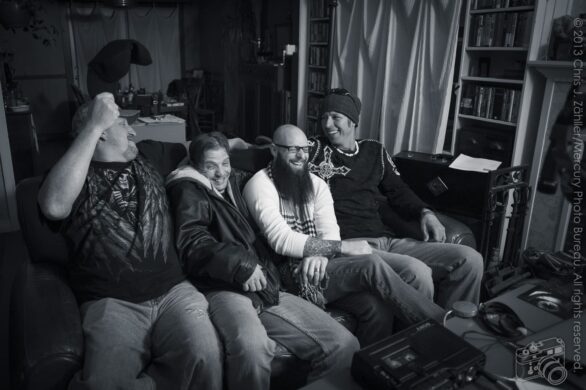
MPBCould you walk me through the lyrics of Needle and Thread?
DaveNeedle and Thread is about exposing yourself […]. You can be anybody on the outside, but you know who you are on the inside, and exposing that [makes you vulnerable].
[I took a lavatory break at this point, but left the recorder running — while I was gone, there was discussion over Dave’s beard, during which he revealed that he was contemplating shaving it off. When asked, Why?
he gave this answer:]
Dave[…] Yeah, I got really a good jawline, too — [laughter]
JimThat’s all it is! I need to look better! I got a purty mouth!
[Interview resumes.]
MPBNone of you are originally from Oklahoma. How did you wind up here?
RaymondI played in 2 bands [in California, then I] gave it up for about 8 or 9 years. [There were] family problems; all my mom’s family was out here already. [My mom] was just […] a wild child; she moved to California [and] had me and my brother out there, and then, [when I was] 14 or 15, she got sick. [That’s when] we all moved out here […].
I was the only 1 in my family born in California; everyone else is from Oklahoma.
JimI was born and raised in western New York just south of Buffalo, on Lake Erie. [I grew up poor. I graduated from high school at age 17 and] went straight into the military. Was in the US army for 8 years; I got out at Ft. Sill and I spent the next 3 years [in] Oklahoma.
I decided to go back New York to be with family; after 10 years of that, I said, I have to be away from family,
and that’s [how I came back here.]
DaveI was born and raised in Arlington, Texas; I’ve been all over the place. I ended up […] in Oklahoma in 2007; my father had moved up here previously from Texas, for work. I was actually passing through, but I decided […] to stop in, spend some time with my old man […], and I ended up getting a job.
I went to go fill a prescription 1 day, in Edmond, and my [future] wife was behind the counter, dealin’ drugs,
and she had a lot of nice [tatoos]. So I noticed that, and [it gave me an excuse] to say, Hello.
I actually left, and I went out to my truck, and she [later] told me that she was speaking to [a coworker], and she was like, Man, that guy was really nice, but he didn’t even ask me for my number. I’ll never see him again; what a dirt bag!
[So I called the pharmacy from my truck,] and I was like, Hey, this is Dave; I just picked up the script in there; remember me?
; she was like, Yeah!
I was like, Can I take you out some time?
[…]
MattI was born in Nüremberg, Germany; I lived there for 2 years. We got back to the states after my dad got out and moved up and down the whole east coast […]. Moved to south Texas for a while and ended up in Arizona, Illinois, Missouri, ended up here in Oklahoma because some of my mom’s family had moved [here] from West Virginia […].
I’ve left several times; I was in the army myself. I ended up back here after I got out of the army, and I’ve been here since.
DaveAll 3 of us [gestures to himself, Matt, and Jim] are ex-military.
MPBWhat other bands have each of you played in? What’s your earliest involvement with music?
RaymondMy very 1st band was called Mentally Disturbed [; that was around] ’91. Then I moved out here, and I was in a band called Omission, [then] Carnage, [plus a couple with the guys from] LTD.
[The band digresses into a discussion of trying to match a backing vocalist to Dave’s singing. Jim suggests that Raymond should sing backup, saying that he sounds like he’s gargling razor blades.
]
More recently, before [One Gun Solution], I was in […] Curbside Attraction.
JimI was in chorus from 2nd grade to 11th. I was kicked out because my voice dropped too low for bass II. Puberty hit me really hard.
[My 1st band was when I was in the military], at Ft. Campbell, Kentucky […]. We were all into Metallica. We started just playing covers; I think we wrote 1 song; it was called Kill the Dogs […].
While I was at Ft. Campbell, I was just playing with random people at the rec center, you know, just getting a wide variety of styles from everybody who was walking into the “jam” room. When I got to Germany, I really didn’t do anything with anybody, other than I had a friend who played guitar, and he was into Metallica; he was into Extreme […].
In the summer of 1996, I got into a country band in Germany; most of the people in the band were German. Then I got told I was leaving Germany, so I had to cut it short.
When I came back to the states, I didn’t [play any music] until about 2005. I was working for Penny Saver or Thrifty Nickel in New York; I actually got the job because I’d answered an ad for a drum tryout; well, they tried out a bunch of different drummers, and I was [the 1 they called], because, they said, I fit better, you know, […] I have a better “feeling” than some drummers. I played with them for about 4 or 5 years, and it just fizzled out.
And after that, there’s a country singer out there, named Todd Andrews; he’s signed with Tate Music Group; I was with him for a few months before I moved to Oklahoma. And then I joined a band called Sin for Sin; that’s what [the bandleader] called it, but we couldn’t use [the name], because somebody else was already using it. [After that, I met Ray.]
DaveI guess my 1st real music project was in elementary school. I […] played the stand-up bass. I […] grew up just a block away from the Pantera house in Dalworthington Gardens. There’s 2 small cities in Arlington[, Texas], Pantego and Dalworthington Gardens, and I used to carry that sucker; I had to walk home from school, and [the bass] was 3 times the size of me.
I was very into opera, classical music; […] to this day, I still love to [hear classical music played live].
I always wanted to be [a singer in a band] — not that I had an addiction to being the center of attention or anything, but I just love to please; I love to entertain. So I was just in various, kind of unmentionable musical projects; actually, 1 of my favorite bands from Arlington [is] Spoonfed Tribe; there’s like, 13, 14, 16 of them, depending on what show you see them; I always wanted to be a part of that; never could, but they’re real good friends […].
[I] came here; was in a little project called Black Water; and then, there was a previous One Gun Solution project; that’s how I came with the name. It was more of a Progressive Metal band. Metal meets Tool type of thing […]. Then I met these guys […].
Matt[I played viola in middle school orchestra]. I did that for several years, until I picked up guitar, and my brother and another fella that we grew up with […] started a band, Aunt Mary’s Ant Farm; it had kind of a “jam” band kind of a feel. And we played on and off, together, until, shoot, 2005 or ’06. Our bass player, Josh, graduated from college and moved to Japan […]. My brother graduated [and got his engineering licenses]. So we all went our separate ways.
I didn’t play guitar for several years, and finally ended up meeting these guys; got into Curbside Attraction with Jim and Ray, and Dave came shortly after.
MPBHave you toured yet?
DaveNo, man; it’s all local.
JimWe have played in Dallas, but we all have jobs, so it’s tough to schedule a tour. We’d like to, when it becomes feasible.
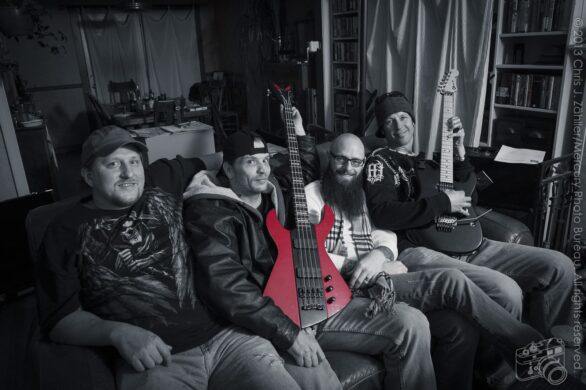
Gallery
The Gallery
